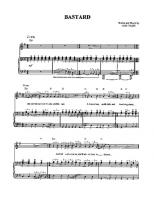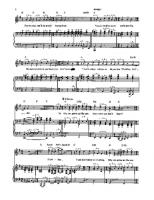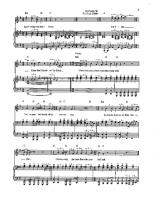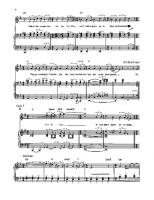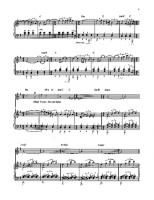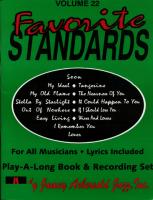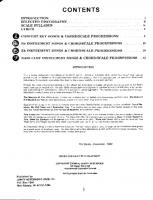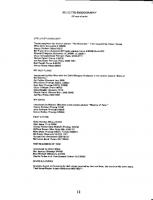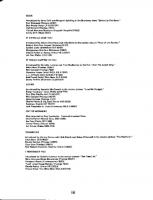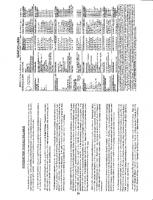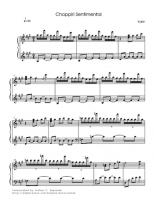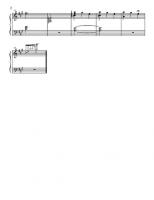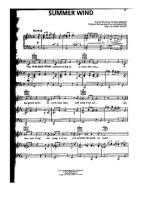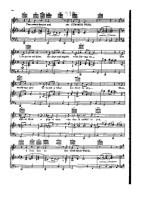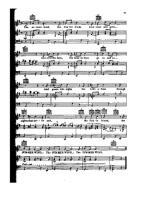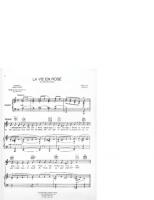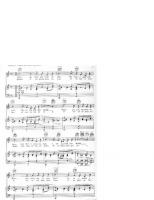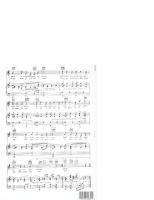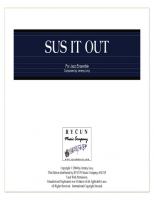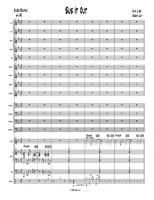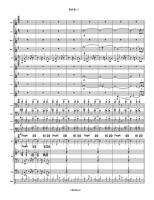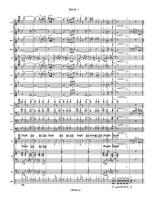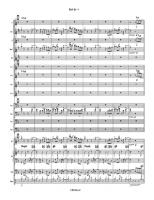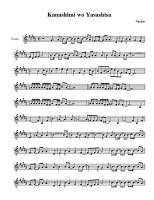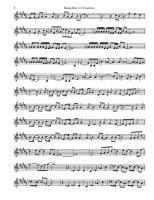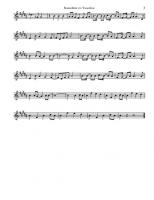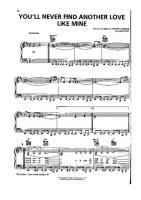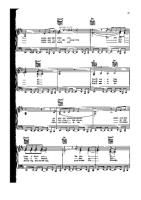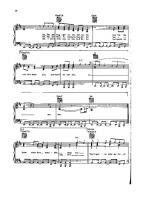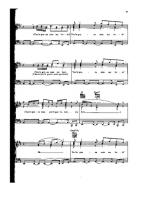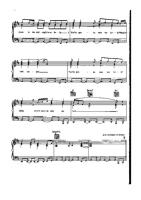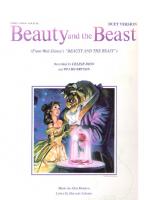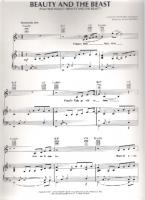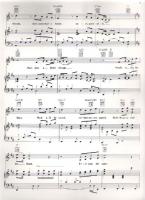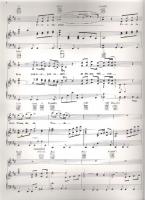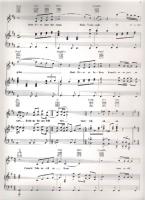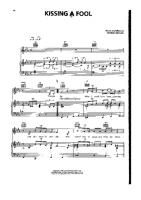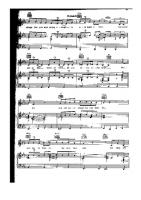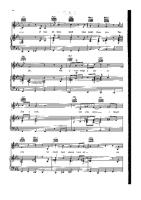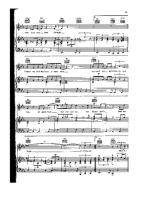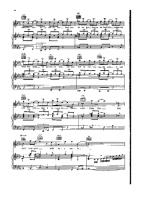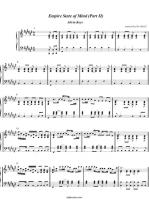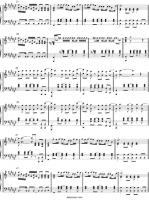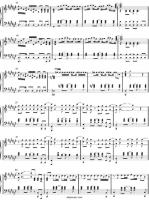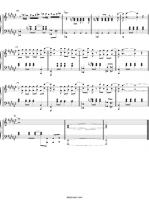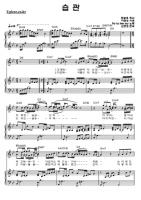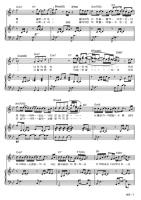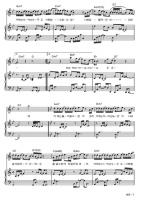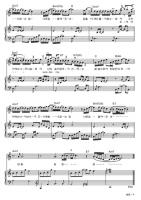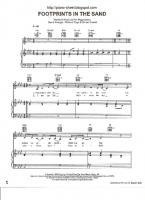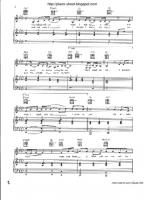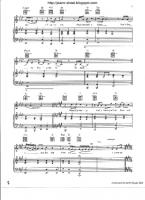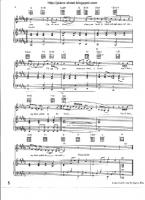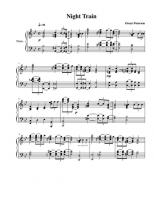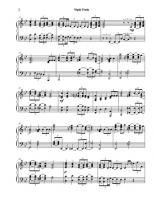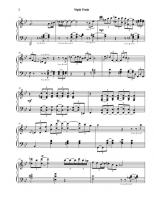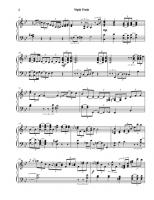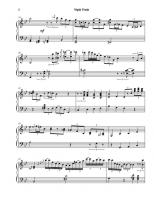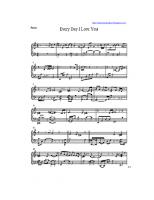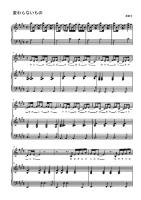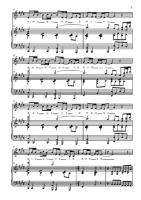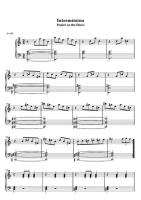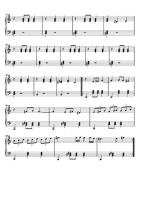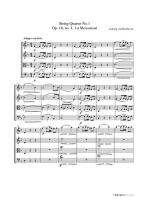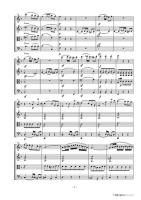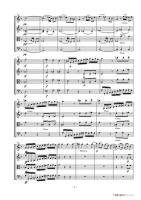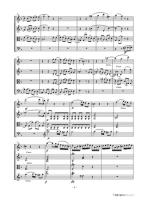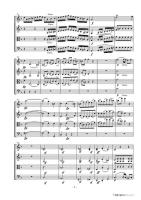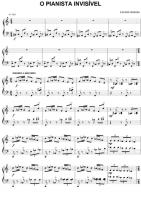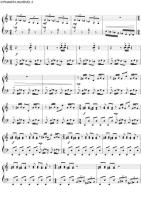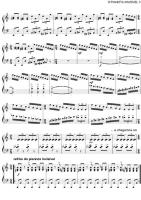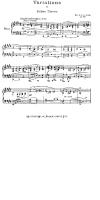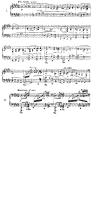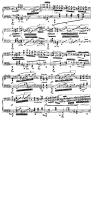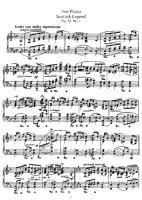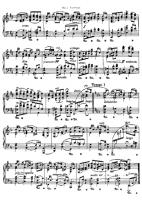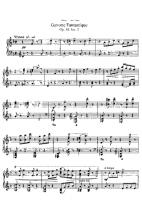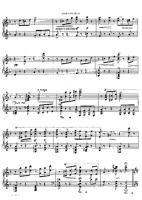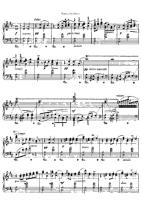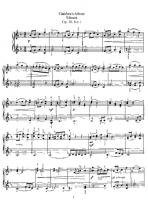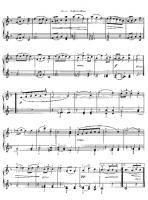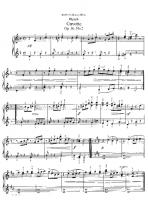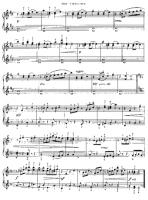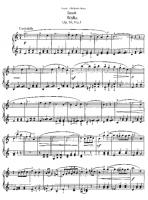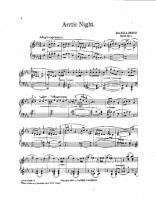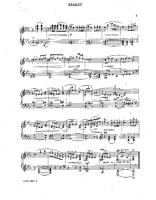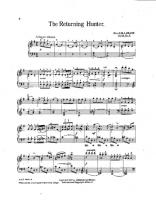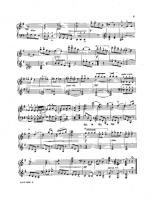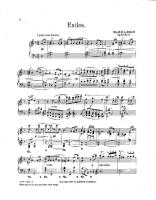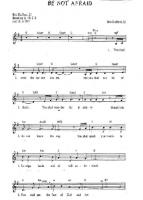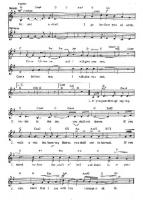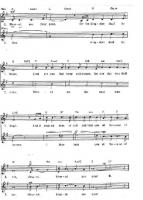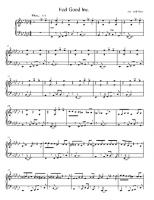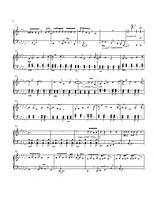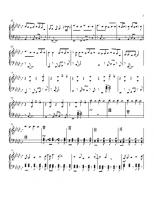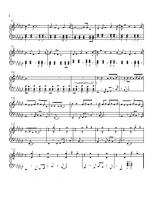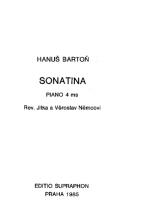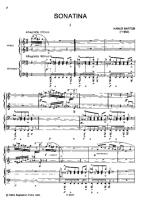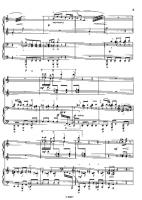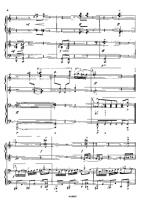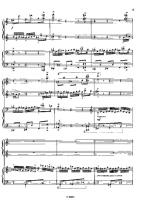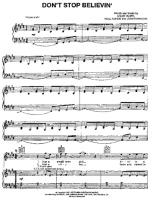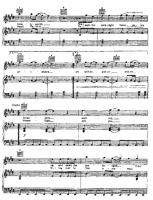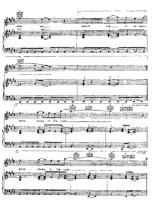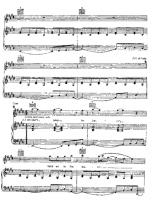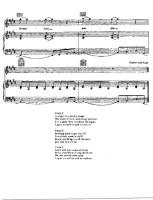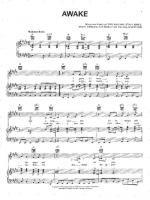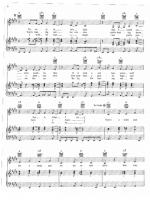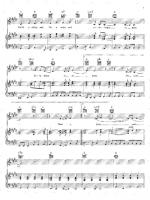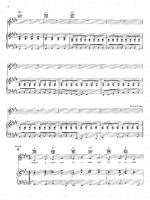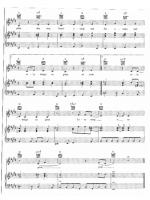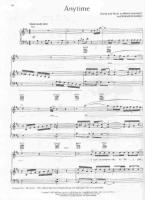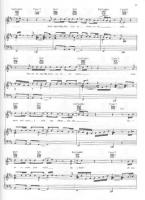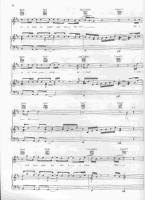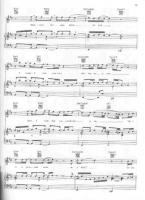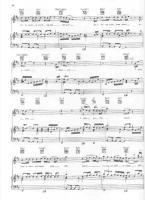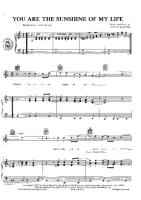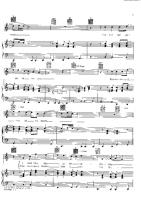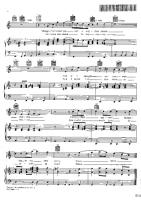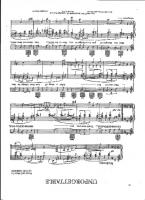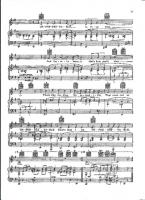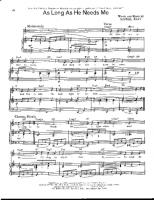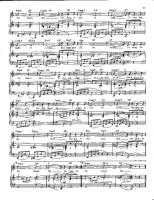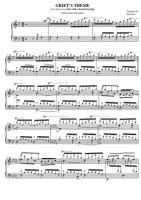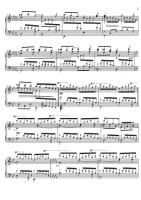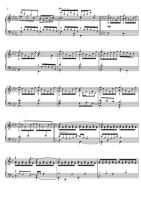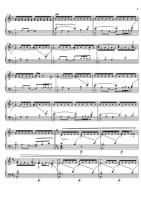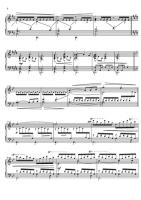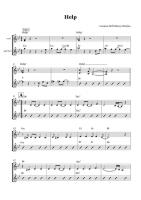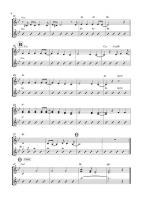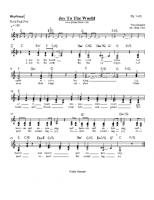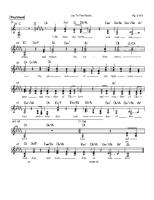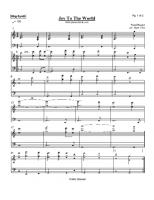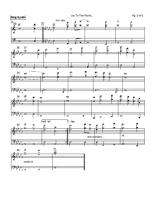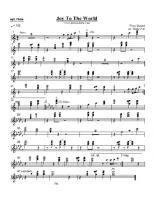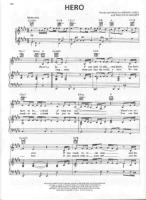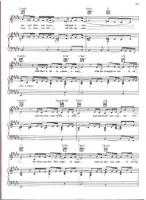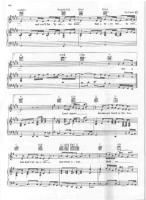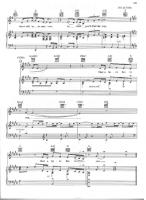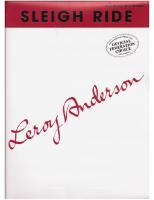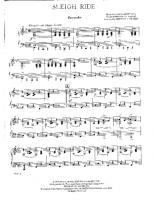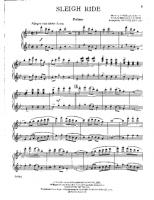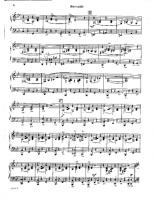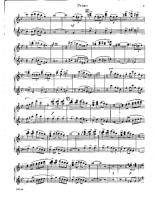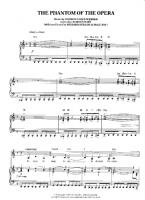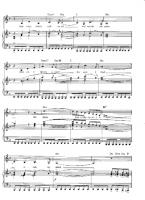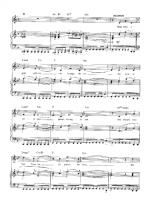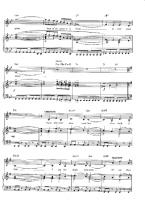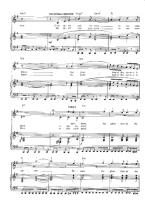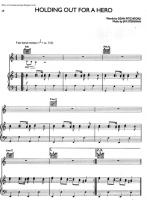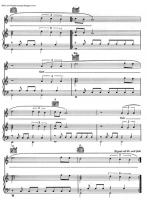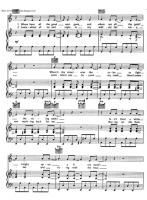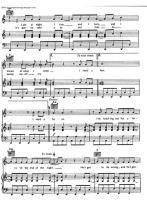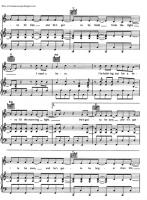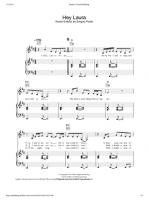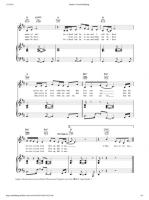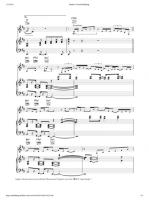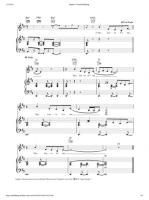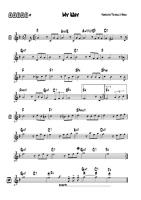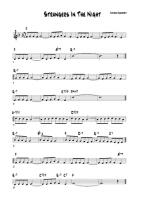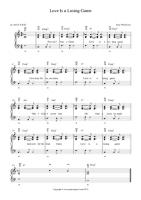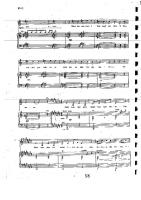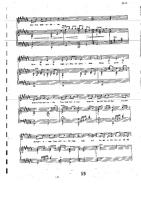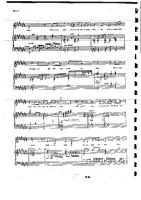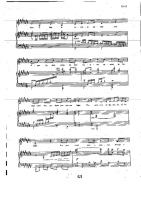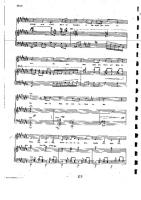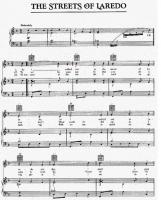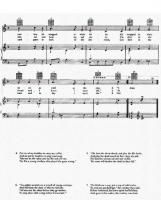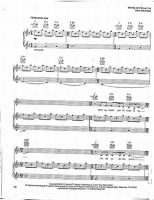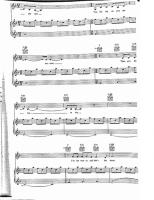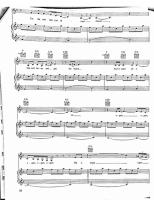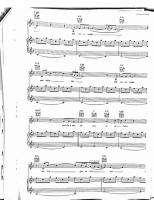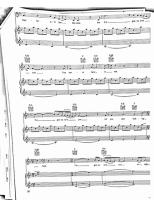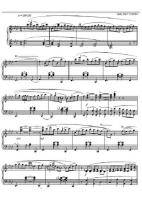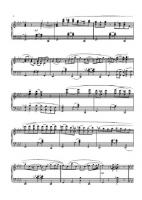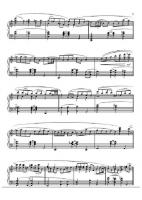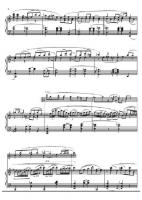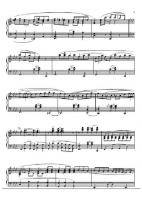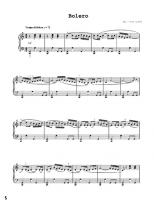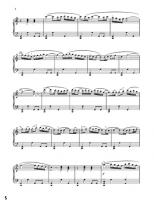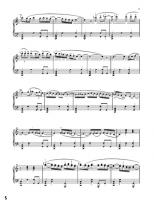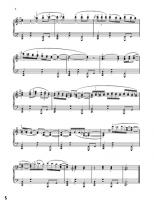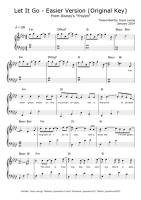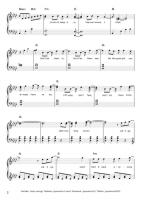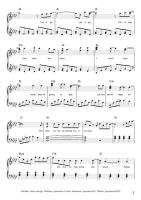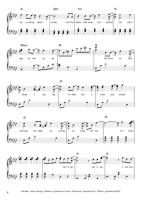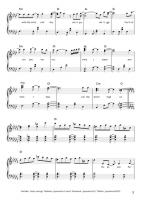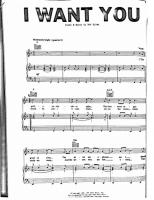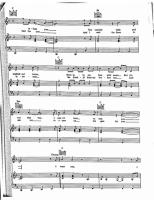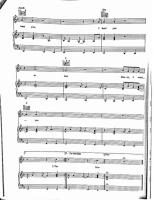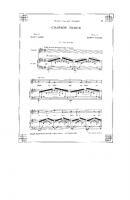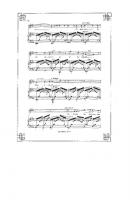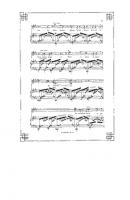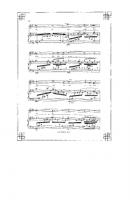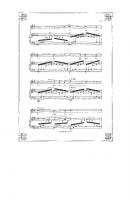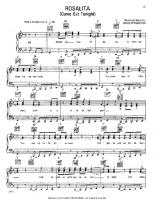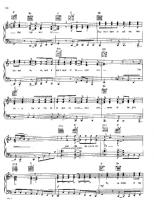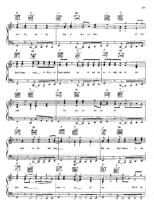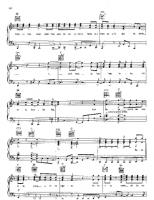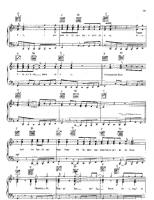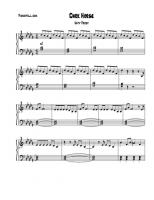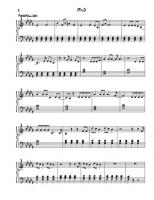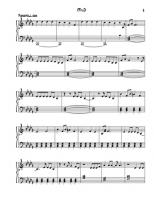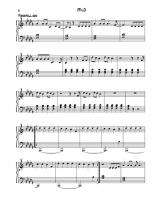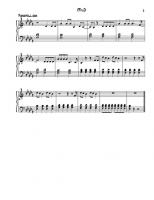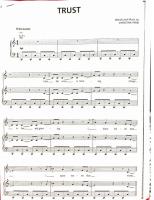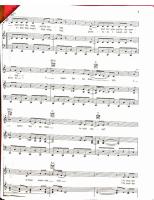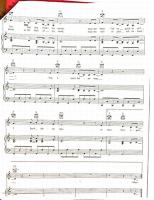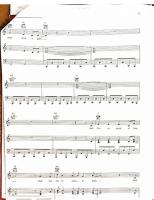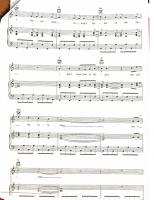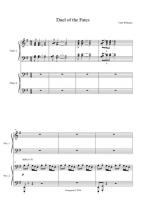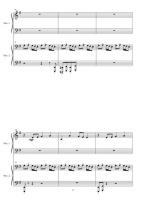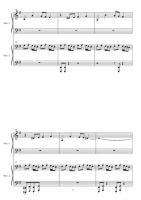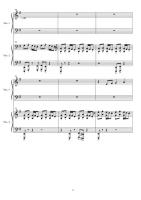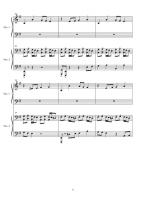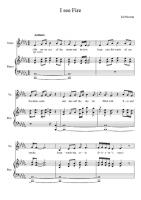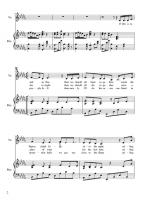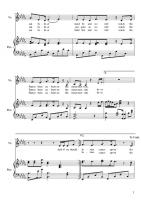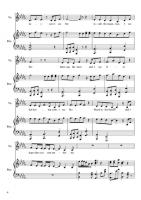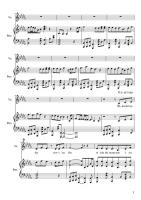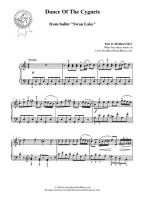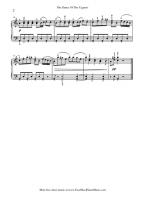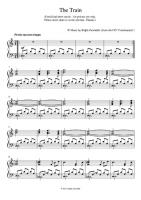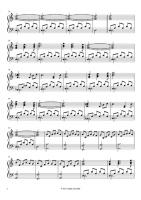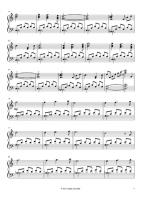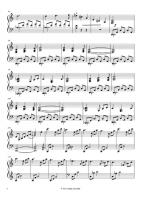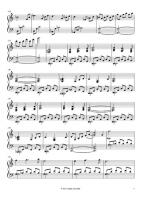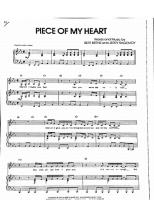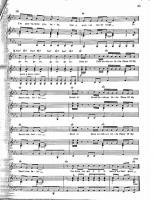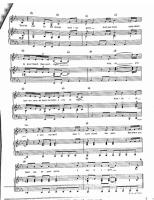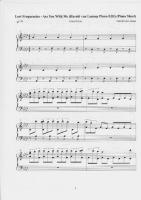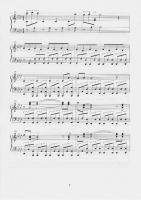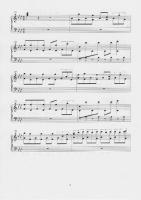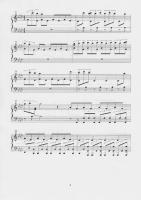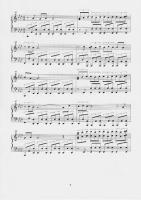Latest Sheets
Ben Folds
Benjamin Scott Folds (born September 12, 1966 in Winston-Salem, North Carolina) is an American singer and pianist. He originally gained fame as a member of the rock band, Ben Folds Five. Ben has released three solo albums: Fear of Pop: Volume 1, Rockin' the Suburbs, and Ben Folds Live. Fear of Pop was released while Ben Folds Five were still together; Suburbs and Live were released afterwards. Since Fear of Pop is highly experimental and Live is a collection of live solo recordings of mostly songs originally recorded with Ben Folds Five, Rockin' the Suburbs is Ben's first proper solo release. In late 2003 two solo EPs: Speed Graphic and Sunny 16 were released, with a third entitled Super D released in mid-2004. He currently resides in Adelaide, Australia with his wife, Frally Hynes, and two children, Louis and Grace. He tours Japan and the United States, as well as other parts of the world periodically.
Folds also produced and arranged the most recent William Shatner album, Has Been (2004); he previously worked with Shatner on the songs 'In Love' and 'Still in Love' for Fear of Pop.
Folds described his former band, Ben Folds Five, as 'punk rock for sissies,' and his oddball lyrics often contain nuances of depression, melancholy and self-conflict. While he was with the band Ben Folds Five and since his departure, Folds also provided a number of songs for films soundtrack. Some of these include 'Lonely Christmas Eve' for the film How the Grinch Stole Christmas! (2000) and a rendition of the Beatles' 'Golden Slumbers' for the film I Am Sam (2001).
On a planned tour of Australia, Folds teamed up with fellow namesakes Ben Kweller and Ben Lee to travel the country together as The Bens, at the suggestion of a fan on Ben Kweller's official website. The trio also went on to record an four-track EP together, entitled The Bens.
In summer of 2004, Folds co-headlined an American tour with fellow rockers Rufus Wainwright and Guster. His fourth solo album entitled 'Songs for Silverman' is slated for release on April 26, 2005.
Folds also produced and arranged the most recent William Shatner album, Has Been (2004); he previously worked with Shatner on the songs 'In Love' and 'Still in Love' for Fear of Pop.
Folds described his former band, Ben Folds Five, as 'punk rock for sissies,' and his oddball lyrics often contain nuances of depression, melancholy and self-conflict. While he was with the band Ben Folds Five and since his departure, Folds also provided a number of songs for films soundtrack. Some of these include 'Lonely Christmas Eve' for the film How the Grinch Stole Christmas! (2000) and a rendition of the Beatles' 'Golden Slumbers' for the film I Am Sam (2001).
On a planned tour of Australia, Folds teamed up with fellow namesakes Ben Kweller and Ben Lee to travel the country together as The Bens, at the suggestion of a fan on Ben Kweller's official website. The trio also went on to record an four-track EP together, entitled The Bens.
In summer of 2004, Folds co-headlined an American tour with fellow rockers Rufus Wainwright and Guster. His fourth solo album entitled 'Songs for Silverman' is slated for release on April 26, 2005.
Jamey Aebersold
Jamey Aebersold (born July 21, 1939 in New Albany, Indiana) is an American jazz saxophonist and music educator. His "Play-A-Long" series of instructional book and CD collections, using the chord-scale system, the first of which was released in 1967, are an internationally renowned resource for jazz education. As of 2009, 126 of these collections have been published by Aebersold, who currently teaches musical improvisation at the University of Louisville. He is also an adept pianist, bassist, and banjoist.
Chibi Vampire
Chibi Vampire, originally released in Japan as Karin (Japanese: かりん?), is a Japanese manga series written and illustrated by Yuna Kagesaki. The story is about an unusual vampire girl, who instead of drinking blood must inject it into others because she produces too much. Chibi Vampire first premiered in the shōnen magazine Monthly Dragon Age in the October 2003 issue, and ran until February 2008. The individual chapters were published by Kadokawa Shoten into fourteen collected volumes.
In 2003, Tohru Kai began writing a series of light novels based on the manga, with Kagesaki providing the illustrations. The nine-volume series was published in Japan by Fujimi Shobo. Both the manga and light novel series are licensed for English language release by Tokyopop. Tokyopop renamed the manga series to Chibi Vampire and the novel series to Chibi Vampire: The Novel.
In 2005, an anime adaptation was produced by J.C.Staff and directed by Shinichiro Kimura. Spanning twenty-four episodes, the series aired in Japan on WOWOW from November 3, 2005 through May 11, 2006. It was licensed for an English release to Region 1 DVD, under the original name Karin, by Geneon USA. On July 3, 2008, Geneon Entertainment and Funimation Entertainment announced that Funimation had agreed to be the exclusive North American distributor of Geneon titles, including Karin.
In 2003, Tohru Kai began writing a series of light novels based on the manga, with Kagesaki providing the illustrations. The nine-volume series was published in Japan by Fujimi Shobo. Both the manga and light novel series are licensed for English language release by Tokyopop. Tokyopop renamed the manga series to Chibi Vampire and the novel series to Chibi Vampire: The Novel.
In 2005, an anime adaptation was produced by J.C.Staff and directed by Shinichiro Kimura. Spanning twenty-four episodes, the series aired in Japan on WOWOW from November 3, 2005 through May 11, 2006. It was licensed for an English release to Region 1 DVD, under the original name Karin, by Geneon USA. On July 3, 2008, Geneon Entertainment and Funimation Entertainment announced that Funimation had agreed to be the exclusive North American distributor of Geneon titles, including Karin.
Johnny Mercer
John Herndon "Johnny" Mercer (November 18, 1909 – June 25, 1976) was an American lyricist, songwriter and singer. He was also the founder of Capitol Records.
He is best known as a lyricist, but he also composed music. He was also a popular singer who recorded his own songs as well as those written by others. From the mid-1930s through the mid-1950s, many of the songs Mercer wrote and performed were among the most popular hits of the time. He wrote the lyrics to more than fifteen hundred songs, including compositions for movies and Broadway shows. He received nineteen Academy Award nominations, and won four Best Original Song Oscars.
He is best known as a lyricist, but he also composed music. He was also a popular singer who recorded his own songs as well as those written by others. From the mid-1930s through the mid-1950s, many of the songs Mercer wrote and performed were among the most popular hits of the time. He wrote the lyrics to more than fifteen hundred songs, including compositions for movies and Broadway shows. He received nineteen Academy Award nominations, and won four Best Original Song Oscars.
Edith Piaf
Édith Piaf (19 December 1915—10 October 1963) was a French singer and cultural icon who "is almost universally regarded as France's greatest popular singer." Her singing reflected her life, with her specialty being the ballads. Among her famous songs are "La vie en rose" (1946), "Hymne à l'amour" (1949), "Milord" (1959), "Non, je ne regrette rien" (1960), and Padam Padam.
Edith Piaf's signature song "La vie en rose" was written in 1945 and was voted a Grammy Hall of Fame Award in 1998.
The legendary Paris Olympia concert hall is where Piaf achieved lasting fame, giving several series of concerts at the hall, the most famous venue in Paris, between January 1955 and October 1962. Excerpts from five of these concerts (1955, 1956, 1958, 1961, 1962) were issued on record and CD and have never been out of print. The 1961 concerts were promised by Piaf in an effort to save the venue from bankruptcy and where she debuted her song "Non, je ne regrette rien". In April 1963, Piaf recorded her last song, "L'homme de Berlin".
Edith Piaf's signature song "La vie en rose" was written in 1945 and was voted a Grammy Hall of Fame Award in 1998.
The legendary Paris Olympia concert hall is where Piaf achieved lasting fame, giving several series of concerts at the hall, the most famous venue in Paris, between January 1955 and October 1962. Excerpts from five of these concerts (1955, 1956, 1958, 1961, 1962) were issued on record and CD and have never been out of print. The 1961 concerts were promised by Piaf in an effort to save the venue from bankruptcy and where she debuted her song "Non, je ne regrette rien". In April 1963, Piaf recorded her last song, "L'homme de Berlin".
Jeremy Levy
Composer/Arranger/Orchestrator, Jeremy Levy has worked in nearly every medium in Los Angeles. As an orchestrator, he adds his musical touch to scores in film, television, and video games. Recent projects include Minions, Revenge, Empire, The Book of Life, Batman: Arkham Knight, A Walk Among the Tombstones, Smurfs 2, Jack Reacher, Tower Heist, The Event, No Ordinary Family, Battlestar Gallactica, Infamous 2, and God of War 3. He has also provided arranging and music preparation services on everything from The Tonight Show with Jay Leno, to American Idol.
Naruto
Naruto is an ongoing Japanese manga series written and illustrated by Masashi Kishimoto with an anime adaptation. The plot tells the story of Naruto Uzumaki, a loud, hyperactive, unpredictable, adolescent ninja who constantly searches for recognition and aspires to become a Hokage, the ninja in his village that is acknowledged as the leader and the strongest of all. The series is based on a one-shot that Kishimoto first authored in the August 1997 issue of Akamaru Jump.
The manga was first published by Shueisha in 1999 in the 43rd issue of Japan's Weekly Shōnen Jump magazine and it is still being released with forty-four volumes. The manga would be later adapted into an anime produced by Studio Pierrot and Aniplex. It premiered across Japan on the terrestrial TV Tokyo network and the anime satellite television network Animax on October 3, 2002. The first series lasted nine seasons, while Naruto: Shippūden, a sequel of the series, began its first on February 15, 2007 and is still airing.
The manga was first published by Shueisha in 1999 in the 43rd issue of Japan's Weekly Shōnen Jump magazine and it is still being released with forty-four volumes. The manga would be later adapted into an anime produced by Studio Pierrot and Aniplex. It premiered across Japan on the terrestrial TV Tokyo network and the anime satellite television network Animax on October 3, 2002. The first series lasted nine seasons, while Naruto: Shippūden, a sequel of the series, began its first on February 15, 2007 and is still airing.
Gamble and Huff
Kenneth Gamble (born October 14, 1943, Philadelphia) and Leon A. Huff (born April 8, 1942, Camden, New Jersey) are an American songwriting and record production team who have written and produced 15 gold singles and 22 gold albums. They were pioneers of Philadelphia soul and the in-house creative team for the Philadelphia International Records label. On March 10, 2008, the team was inducted into The Rock and Roll Hall of Fame in the non-performer category. Gamble married R&B singer Dee Dee Sharp in 1967 and the two remained married until 1980.
Beauty and the Beast
Beauty and the Beast is a 1991 animated American family film. It is the thirtieth animated feature produced by Walt Disney Feature Animation. The film received its premiere at the El Capitan Theatre in Hollywood on November 13, 1991. This film, one of the best known of the Disney studio's films, is based on the well-known fairy tale Beauty and the Beast, about a beautiful woman kept in a castle by a horrific monster. It is the first and only full-length animated feature film to ever be nominated for an Academy Award for Best Picture (it lost to The Silence of the Lambs). Heightening the level of performance in the era known as the Disney Renaissance (1989-1999, beginning with The Little Mermaid and ending with Tarzan ), many animated films following its release have been influenced by its blending of traditional animation and computer generated imagery.
Beauty and the Beast ranked 7th on the American Film Institutes's list of best animated films, #22 on the Institutes's list of best musicals and #34 on its list of the best romantic American movies. On the list of the greatest songs from American movies, Beauty and the Beast ranked #62. The film was adapted into a Broadway musical of the same name, which ran from 1994 to 2007.
In 2002, Beauty and the Beast was added to the United States National Film Registry as being deemed "culturally, historically, or aesthetically significant." In January of the same year, the film was reissued in IMAX format in a special edition edit including a new musical sequence. A two-disc Platinum Edition DVD release followed in October.
Beauty and the Beast ranked 7th on the American Film Institutes's list of best animated films, #22 on the Institutes's list of best musicals and #34 on its list of the best romantic American movies. On the list of the greatest songs from American movies, Beauty and the Beast ranked #62. The film was adapted into a Broadway musical of the same name, which ran from 1994 to 2007.
In 2002, Beauty and the Beast was added to the United States National Film Registry as being deemed "culturally, historically, or aesthetically significant." In January of the same year, the film was reissued in IMAX format in a special edition edit including a new musical sequence. A two-disc Platinum Edition DVD release followed in October.
George Michael
Georgios Kyriacos Panayiotou (born June 25, 1963) best known as George Michael, is a two-time Grammy Award winning, English singer-songwriter, who has had a career as frontman of the duo Wham! as well as a soul-influenced, solo pop musician. He has sold over 100 million records worldwide, encompassing 12 British #1 singles, 7 British #1 albums, 10 US #1 singles, and 2 US #1 albums. His 1987 debut solo album, Faith became one of the best selling albums of all time, and also the first album to produce six top 5 singles in the United States and it has sold over 20 million copies worldwide. All four of his solo studio albums have all reached #1 on the U.K. charts and have gone on to become huge international successes. This success has made George Michael the most played artist on British radio over the past two decades.
Alicia Keys
Alicia J. Augello-Cook (born January 25, 1981), and has won numerous awards, including eleven Grammy Awards, seventeen Billboard Music Awards, three American Music Awards.
Her debut album Songs in A Minor was a worldwide success, selling nearly 11 millions albums, and received five Grammy Awards in 2002, with Alicia winning Best New Artist and also Song of the Year for "Fallin'".
Her debut album Songs in A Minor was a worldwide success, selling nearly 11 millions albums, and received five Grammy Awards in 2002, with Alicia winning Best New Artist and also Song of the Year for "Fallin'".
Fly to the Sky
Fly to the Sky (Korean: 플라이 투 더 스카이) is a South Korean R&B duo, consisting of Korean-American Brian Joo and South Korean native Hwanhee.
Initially marketed as a duo that can sing, rap, and dance, their early works featured bubblegum pop and upbeat techno music. The duo later changed their image and style with the release of Sea of Love in 2002. With their subsequent albums, the duo solidified their status as R&B artists and are credited as the first R&B duo of South Korea.
Initially marketed as a duo that can sing, rap, and dance, their early works featured bubblegum pop and upbeat techno music. The duo later changed their image and style with the release of Sea of Love in 2002. With their subsequent albums, the duo solidified their status as R&B artists and are credited as the first R&B duo of South Korea.
Leona Lewis
Leona Louise Lewis (born 3 April 1985) is an English pop and R&B singer-songwriter, and the winner of the third series of UK television talent show The X Factor. Her UK debut single, "A Moment Like This", broke a world record after it was downloaded over 50,000 times within 30 minutes.
Her second single, "Bleeding Love", was the biggest-selling single of 2007 in the UK, topped over thirty national singles charts and became a number one single on the first week in France and number one in the United States.
Her debut album, Spirit, was released in Europe in November 2007, and became the fastest-selling debut album ever in both the United Kingdom and Ireland. Released in North America in April 2008, Spirit debuted at number one on the US Billboard 200 chart and made Lewis the first British solo artist to top the chart with a debut album.
With her album reaching number one in at least three continents and nine countries, Lewis has had one of the most successful launches of any television talent show contestant ever.
Her second single, "Bleeding Love", was the biggest-selling single of 2007 in the UK, topped over thirty national singles charts and became a number one single on the first week in France and number one in the United States.
Her debut album, Spirit, was released in Europe in November 2007, and became the fastest-selling debut album ever in both the United Kingdom and Ireland. Released in North America in April 2008, Spirit debuted at number one on the US Billboard 200 chart and made Lewis the first British solo artist to top the chart with a debut album.
With her album reaching number one in at least three continents and nine countries, Lewis has had one of the most successful launches of any television talent show contestant ever.
Oscar Peterson
Oscar Emmanuel Peterson, CC, CQ, O.Ont. (August 15, 1925 – December 23, 2007) was a Canadian jazz pianist and composer. He was called the "Maharaja of the keyboard" by Duke Ellington, "O.P." by his friends, and was a member of jazz royalty. He released over 200 recordings, won seven Grammy Awards, and received other numerous awards and honours over the course of his career. He is considered to have been one of the greatest jazz pianists of all time, who played thousands of live concerts to audiences worldwide in a career lasting more than 65 years.
Boyzone
Boyzone is a popular Irish boy band of the 1990s that reformed in 2007. They had major success in the UK and Ireland and differing levels of success in parts of Europe and Asia with six #1 hit singles in the UK. By 2007 they had sold over 15 million records.
Boyzone was put together in 1993 by Louis Walsh who is also known for managing Johnny Logan and Westlife. Before even recording any material they made a now infamous appearance on RTÉ's The Late Late Show. Their first album Said and Done was released in 1995 and the following two studio albums in 1996 and 1998. Four compilation albums have been released, the latest being The Silver Collection in summer 2007.
Boyzone was put together in 1993 by Louis Walsh who is also known for managing Johnny Logan and Westlife. Before even recording any material they made a now infamous appearance on RTÉ's The Late Late Show. Their first album Said and Done was released in 1995 and the following two studio albums in 1996 and 1998. Four compilation albums have been released, the latest being The Silver Collection in summer 2007.
Hanako Oku
Hanako Oku (奥 華子 Oku Hanako?, born March 20, 1978 in Funabashi, Chiba, Japan) is a J-Pop singer famous in her native Japan for her piano ballads. She rose to fame after performing the end-title track for the Madhouse film The Girl Who Leapt Through Time in 2006. She was signed to a major record label the preceding year.
Panic at the Disco
Panic at the Disco (formerly known as Panic! at the Disco) is a rock band that originated in Las Vegas, Nevada, USA. Their sound incorporates elements of pop punk, big beat, electronica, techno, and rock, along with many other genres like psychedelic, baroque pop, folk and jazz. Their 2005 debut album, A Fever You Can't Sweat Out, reached #13 on the US Billboard 200, and has sold over 2.2 million copies since its September 2005 release. The band's second album, Pretty. Odd., was released on March 25, 2008 and debuted at #2 in the US.
Beethoven
Ludwig van Beethoven (16 December 1770 - 26 March 1827) was a German composer and pianist. He was a crucial figure in the transitional period between the Classical and Romantic eras in Western classical music, and remains one of the most respected and influential composers of all time.
Born in Bonn, then in the Electorate of Cologne (now in modern-day Germany), he moved to Vienna in his early twenties and settled there, studying with Joseph Haydn and quickly gaining a reputation as a virtuoso pianist. Beethoven's hearing gradually deteriorated beginning in his twenties, yet he continued to compose masterpieces, and to conduct and perform, even after he was completely deaf.
Born in Bonn, then in the Electorate of Cologne (now in modern-day Germany), he moved to Vienna in his early twenties and settled there, studying with Joseph Haydn and quickly gaining a reputation as a virtuoso pianist. Beethoven's hearing gradually deteriorated beginning in his twenties, yet he continued to compose masterpieces, and to conduct and perform, even after he was completely deaf.
Lincoln Antonio
Amy Beach
Amy Marcy Cheney Beach (September 5, 1867 – December 27, 1944) was an American composer and pianist. She was the first successful American female composer of large-scale art music. As a pianist, she was acclaimed for concerts she gave in the United States and in Germany.
Bob Dufford
Robert J. Dufford, S. J. (born 1943) is a Jesuit priest, a former member of the St. Louis Jesuits musical group, and a composer of Catholic liturgical music. His most popular song is "Be Not Afraid." His work is included in such hymnals as Glory and Praise and Gather.
Gorillaz
Gorillaz are an English virtual band created in 1998 by Damon Albarn and Jamie Hewlett. The band consists of four animated members: 2D (lead vocals, keyboard), Murdoc Niccals (bass guitar), Noodle (guitar, keyboard, and backing vocals) and Russel Hobbs (drums and percussion). These members are completely fictional and are not personas of any "real life" musicians involved in the project. Their fictional universe is explored through the band's website and music videos, as well as a number of other media, such as short cartoons. The music is a collaboration between various musicians, with Albarn being the only permanent musical contributor. Writers and critics have described their music as alternative rock, Britpop, trip hop, hip hop, electronica, indie, dub, reggae and pop.
Hanus Barton
Prof. Hanus Barton ( 16. May 1960 in Prague ) is a Czech composer and pianist.
Journey
Journey is an American rock band formed in San Francisco, California in 1973.
The band has gone through several phases since its inception by former members of Santana. The band's greatest commercial success came in the late 1970s through the early 1980s with a series of power ballads and songs such as "Don't Stop Believing", "Any Way You Want It", "Faithfully", "Open Arms", "Separate Ways", and "Wheel in the Sky."
Journey has been eligible for induction into the Rock & Roll Hall of Fame since 2000, but Gregg Rolie is currently the only member of Journey who has been inducted—as a member of parent band Santana. In 2009, Steve Perry, the band's best-known lead vocalist, will be eligible for induction as a solo artist.
Current members:
Neal Schon - Lead & rhythm guitars, backing vocals, lead vocals (1973-present)
Ross Valory - Bass, backing vocals, lead vocals (1973-1985, 1995-present)
Jonathan Cain - Piano, keyboards, harmonica, rhythm guitar, backing vocals, lead vocals (1980-present)
Deen Castronovo - Drums, percussion, backing vocals, lead vocals (1998-present)
Arnel Pineda - Lead vocals (2007-present)
The band has gone through several phases since its inception by former members of Santana. The band's greatest commercial success came in the late 1970s through the early 1980s with a series of power ballads and songs such as "Don't Stop Believing", "Any Way You Want It", "Faithfully", "Open Arms", "Separate Ways", and "Wheel in the Sky."
Journey has been eligible for induction into the Rock & Roll Hall of Fame since 2000, but Gregg Rolie is currently the only member of Journey who has been inducted—as a member of parent band Santana. In 2009, Steve Perry, the band's best-known lead vocalist, will be eligible for induction as a solo artist.
Current members:
Neal Schon - Lead & rhythm guitars, backing vocals, lead vocals (1973-present)
Ross Valory - Bass, backing vocals, lead vocals (1973-1985, 1995-present)
Jonathan Cain - Piano, keyboards, harmonica, rhythm guitar, backing vocals, lead vocals (1980-present)
Deen Castronovo - Drums, percussion, backing vocals, lead vocals (1998-present)
Arnel Pineda - Lead vocals (2007-present)
Letters to Cleo
Letters to Cleo was an alternative rock band from Boston, Massachusetts, best known for the 1994 single "Here & Now", from their full-length debut album Aurora Gory Alice (the band attained exposure outside of Boston due to the album's popularity). The band's members were Michael Eisenstein, Kay Hanley, Stacy Jones, Greg McKenna, Scott Riebling, and later, Tom Polce.
The group disbanded in 2000 but reunited for a small tour in 2008. As of early 2016, the members of the band have hinted (as opposed to outright announcing) via social media that they are back in the studio working on a new Letters To Cleo album, with an assumptive supporting tour in the near future.
The group disbanded in 2000 but reunited for a small tour in 2008. As of early 2016, the members of the band have hinted (as opposed to outright announcing) via social media that they are back in the studio working on a new Letters To Cleo album, with an assumptive supporting tour in the near future.
Brian McKnight
Brian McKnight (born June 5, 1969) is a Grammy-nominated American singer, songwriter, arranger, producer, pop and R&B musician. He is a multi-instrumentalist who can play nine instruments: piano, guitar, bass guitar, drums, percussions, trombone, tuba, French horn and trumpet.
McKnight’s vocal style is his own. He does however draw heavily (particularly in his use of melisma) from Stevie Wonder and Michael Sembello. Echoes of Michael McDonald, Kenny Loggins and Take 6 founder Claude V McKnight can also be heard in McKnights voice.
Mcknight also has an uncanny ability to mimic the timbre and style of other singers . He can do a spot on imitation of Nat King Cole, Stevie Wonder, Prince and feels comfortable singing songs written in higher keys.
McKnight’s vocal style is his own. He does however draw heavily (particularly in his use of melisma) from Stevie Wonder and Michael Sembello. Echoes of Michael McDonald, Kenny Loggins and Take 6 founder Claude V McKnight can also be heard in McKnights voice.
Mcknight also has an uncanny ability to mimic the timbre and style of other singers . He can do a spot on imitation of Nat King Cole, Stevie Wonder, Prince and feels comfortable singing songs written in higher keys.
Stevie Wonder
Stevie Wonder (born Stevland Hardaway Judkins on May 13, 1950, name later changed to Stevland Hardaway Morris) is an American singer-songwriter, multi-instrumentalist, and record producer. A prominent figure in popular music during the latter half of the 20th century , Wonder has recorded more than thirty top ten hits, won 26 Grammy Awards (a record for a solo artist), plus one for lifetime achievement, won an Academy Award for Best Song and been inducted into both the Rock and Roll and Songwriters halls of fame. He has also been awarded the Polar Music Prize.
Blind from infancy, Wonder signed with Motown Records as a pre-adolescent at age twelve, and continues to perform and record for the label to this day. He has nine U.S. number-one hits to his name (on the pop Charts, 20 U.S. R&B number one hits), and album sales totaling more than 150 million units. Wonder has recorded several critically acclaimed albums and hit singles, and writes and produces songs for many of his label mates and outside artists as well. Wonder plays the piano, synthesizer, harmonica, congas, drums, bongos, organ, melodica, and clavinet. In his early career, he was best known for his harmonica work, but today he is better known for his keyboard skills and vocals.
Blind from infancy, Wonder signed with Motown Records as a pre-adolescent at age twelve, and continues to perform and record for the label to this day. He has nine U.S. number-one hits to his name (on the pop Charts, 20 U.S. R&B number one hits), and album sales totaling more than 150 million units. Wonder has recorded several critically acclaimed albums and hit singles, and writes and produces songs for many of his label mates and outside artists as well. Wonder plays the piano, synthesizer, harmonica, congas, drums, bongos, organ, melodica, and clavinet. In his early career, he was best known for his harmonica work, but today he is better known for his keyboard skills and vocals.
Nat King Cole
Nathaniel Adams Coles (March 17, 1919 â February 15, 1965), known professionally as Nat King Cole, was an American musician.
Cole first came to prominence as a leading jazz pianist, then switched his emphasis to singing, becoming one of the most popular and best known vocalists of all time.
Cole's first mainstream vocal hit was his 1943 recording of one of his compositions, "Straighten Up and Fly Right", based on a black folk tale that his father had used as a theme for a sermon. Johnny Mercer invited him to record it for the fledgling Capitol Records label. It sold over 500,000 copies, and proved that folk-based material could appeal to a wide audience. Although Nat would never be considered a rocker, the song can be seen as anticipating the first rock and roll records. Indeed, Bo Diddley, who performed similar transformations of folk material, counted Cole as an influence.
Beginning in the late 1940s, Cole began recording and performing more pop-oriented material for mainstream audiences, often accompanied by a string orchestra. His stature as a popular icon was cemented during this period by hits such as "The Christmas Song" (Cole recorded the tune four times: June 14, 1946 as a pure Trio recording; August 19, 1946 with an added string section; August 24, 1953; and again in 1961 for the double album, The Nat King Cole Story. This final version, recorded in stereo, is the one most often heard today.), "Nature Boy" (1948), "Mona Lisa" (1950), "Too Young" (the #1 song in 1951), and his signature tune "Unforgettable" (1951). While this shift to pop music led some jazz critics and fans to accuse Cole of selling out, he never totally abandoned his jazz roots; as late as 1956, for instance, he recorded an all-jazz album, After Midnight.
His last album, L-O-V-E, was recorded in early December 1964 â just a few days before entering the hospital for lung cancer treatment â and released just prior to his death; it peaked at #4 on the Billboard Albums chart in the spring of 1965. A Best Of album went gold in 1968. His 1957 recording of "When I Fall In Love" reached #4 in the UK charts in 1987.
Cole first came to prominence as a leading jazz pianist, then switched his emphasis to singing, becoming one of the most popular and best known vocalists of all time.
Cole's first mainstream vocal hit was his 1943 recording of one of his compositions, "Straighten Up and Fly Right", based on a black folk tale that his father had used as a theme for a sermon. Johnny Mercer invited him to record it for the fledgling Capitol Records label. It sold over 500,000 copies, and proved that folk-based material could appeal to a wide audience. Although Nat would never be considered a rocker, the song can be seen as anticipating the first rock and roll records. Indeed, Bo Diddley, who performed similar transformations of folk material, counted Cole as an influence.
Beginning in the late 1940s, Cole began recording and performing more pop-oriented material for mainstream audiences, often accompanied by a string orchestra. His stature as a popular icon was cemented during this period by hits such as "The Christmas Song" (Cole recorded the tune four times: June 14, 1946 as a pure Trio recording; August 19, 1946 with an added string section; August 24, 1953; and again in 1961 for the double album, The Nat King Cole Story. This final version, recorded in stereo, is the one most often heard today.), "Nature Boy" (1948), "Mona Lisa" (1950), "Too Young" (the #1 song in 1951), and his signature tune "Unforgettable" (1951). While this shift to pop music led some jazz critics and fans to accuse Cole of selling out, he never totally abandoned his jazz roots; as late as 1956, for instance, he recorded an all-jazz album, After Midnight.
His last album, L-O-V-E, was recorded in early December 1964 â just a few days before entering the hospital for lung cancer treatment â and released just prior to his death; it peaked at #4 on the Billboard Albums chart in the spring of 1965. A Best Of album went gold in 1968. His 1957 recording of "When I Fall In Love" reached #4 in the UK charts in 1987.
Lionel Bart
Lionel Bart (1 August 1930 – 3 April 1999) was a writer and composer of British pop music and musicals, best known for creating the book, music and lyrics for Oliver!
He started his songwriting career in amateur theatre, first at The International Youth Centre in 1952 where he and a friend wrote a revue together called IYC Revue 52. The following year the pair auditioned for a production of the Leonard Irwin play The Wages Of Eve at Unity Theatre, London. Shortly after Bart began composing songs for Unity Theatre, contributing material (including the title song) to their 1953 revue Turn It Up, and songs for their 1953 pantomime, an agit prop version of Cinderella. While at Unity he was talent spotted by Joan Littlewood and so joined Theatre Workshop. He also wrote comedy songs for the Sunday lunchtime BBC radio programme The Billy Cotton Band Show.
He first gained widespread recognition through his pop songwriting, penning numerous hits for the stable of young male singers promoted by artist manager and music publisher Larry Parnes. Bart's pop output in this period includes the hits "Living Doll" (written for Cliff Richard) and "Rock with the Cavemen","Handful of Songs", "Butterfingers" and "Little White Bull" (for Tommy Steele). During this period, Mike Pratt as well as Steele were his songwriting partners. In 1957, he won three Ivor Novello Awards, a further four in 1958, and two in 1960. He wrote the theme song for the 1963 James Bond film From Russia with Love. His other hits include: "Do You Mind?" (recorded by both Anthony Newley and Andy Williams), "Big Time" (a 1961 cover of his "Fings Ain't Wot They Used T'Be" show tune by Jack Jones), "Easy Going Me" (Adam Faith) and "Always You And Me" (with Russ Conway).
Bart was also responsible for the discovery of two of Parnes' biggest stars. It was on his recommendation that Parnes went to see singer Tommy Hicks, whom he signed and renamed Tommy Steele, and Bart also suggested that Parnes see singer Reg Smith, who was then performing at the Condor Club. Although Parnes missed his performance, he went round to Smith's house and signed him up on the basis of Bart's recommendation. Smith went on to score a number of UK hits under his new stage name Marty Wilde.
He started his songwriting career in amateur theatre, first at The International Youth Centre in 1952 where he and a friend wrote a revue together called IYC Revue 52. The following year the pair auditioned for a production of the Leonard Irwin play The Wages Of Eve at Unity Theatre, London. Shortly after Bart began composing songs for Unity Theatre, contributing material (including the title song) to their 1953 revue Turn It Up, and songs for their 1953 pantomime, an agit prop version of Cinderella. While at Unity he was talent spotted by Joan Littlewood and so joined Theatre Workshop. He also wrote comedy songs for the Sunday lunchtime BBC radio programme The Billy Cotton Band Show.
He first gained widespread recognition through his pop songwriting, penning numerous hits for the stable of young male singers promoted by artist manager and music publisher Larry Parnes. Bart's pop output in this period includes the hits "Living Doll" (written for Cliff Richard) and "Rock with the Cavemen","Handful of Songs", "Butterfingers" and "Little White Bull" (for Tommy Steele). During this period, Mike Pratt as well as Steele were his songwriting partners. In 1957, he won three Ivor Novello Awards, a further four in 1958, and two in 1960. He wrote the theme song for the 1963 James Bond film From Russia with Love. His other hits include: "Do You Mind?" (recorded by both Anthony Newley and Andy Williams), "Big Time" (a 1961 cover of his "Fings Ain't Wot They Used T'Be" show tune by Jack Jones), "Easy Going Me" (Adam Faith) and "Always You And Me" (with Russ Conway).
Bart was also responsible for the discovery of two of Parnes' biggest stars. It was on his recommendation that Parnes went to see singer Tommy Hicks, whom he signed and renamed Tommy Steele, and Bart also suggested that Parnes see singer Reg Smith, who was then performing at the Condor Club. Although Parnes missed his performance, he went round to Smith's house and signed him up on the basis of Bart's recommendation. Smith went on to score a number of UK hits under his new stage name Marty Wilde.
Alexandre Desplat
Desplat has extensively composed for films, first in France and later in Hollywood, including scores and incidental music for some 100 films among which are Lapse of Memory and Family Express (both 1992), Regarde Les Hommes Tomber (1994), Les Péchés Mortels (1995), the César nominated Un Héros Très Discret (1996), Une Minute De Silence and Sweet Revenge (both 1998), Le Château Des Singes (1999), Home Sweet Home and Reines D'Un Jour (both 2001), the César nominated Sur Mes Lèvres (2002), and Rire Et Châtiment (2003), among others.
Desplat has composed individual songs that have been sung in films by artists such as Akhenaton, Kate Beckinsale, Charlotte Gainsbourg, Valérie Lemercier, Miosotis, and Catherine Ringer. He has also written music for the theatre, including pieces performed at the Comédie Française. Desplat has conducted performances of his music played by the London Symphony Orchestra, the Royal Philharmonic Orchestra, and the Munich Symphony Orchestra. In addition to his composing and performing, Desplat has also given Master Classes at La Sorbonne in Paris and at London's Royal College of Music.
In 2007 he composed the high profile scores for Philip Pullman's The Golden Compass; Zach Helm's directorial debut Mr. Magorium's Wonder Emporium with American composer Aaron Zigman; and the Ang Lee movie Lust, Caution. Prior to these breakout works, he contributed scores for The Luzhin Defence, Girl with a Pearl Earring, Syriana, Birth, Hostage, Casanova, The Nest and The Painted Veil, for which he won the Golden Globe Award for Best Original Score, Los Angeles Film Critics Association Award for Best Music, and the 2006 World Soundtrack Award. He won the 2007 BMI Film Music Award, 2007 World Soundtrack Award, 2007 European Film Award, and received his first Academy Award nomination for Best Original Score for The Queen. He also won the Silver Berlin Bear at the Berlin Film Festival for Best Film Music in The Beat that My Heart Skipped. In 2008, Desplat received his second Oscar nomination for David Fincher's The Curious Case of Benjamin Button.
Desplat's recent projects include Largo Winch, based on the Belgian comic; Afterwards a French-Canadian psychological thriller film directed by Gilles Bourdos in English; Anne Fontaine's Coco avant Chanel based on the life of designer Coco Chanel; Robert Guédiguian's L'Armée du Crime; Cheri, reuniting him with director Stephen Frears, whom he collaborated with on The Queen; Un Prophète reuniting with director Jacques Audiard; Julie & Julia directed by Nora Ephron; Fantastic Mr. Fox, directed by Wes Anderson and based on the novel by Roald Dahl; and New Moon, directed by Chris Weitz, out in November 2009.
Desplat's upcoming projects are The Tree of Life, directed by Terrence Malick, The Ghost, directed by Roman Polanski, and Largo Winch 2 .
Desplat has composed individual songs that have been sung in films by artists such as Akhenaton, Kate Beckinsale, Charlotte Gainsbourg, Valérie Lemercier, Miosotis, and Catherine Ringer. He has also written music for the theatre, including pieces performed at the Comédie Française. Desplat has conducted performances of his music played by the London Symphony Orchestra, the Royal Philharmonic Orchestra, and the Munich Symphony Orchestra. In addition to his composing and performing, Desplat has also given Master Classes at La Sorbonne in Paris and at London's Royal College of Music.
In 2007 he composed the high profile scores for Philip Pullman's The Golden Compass; Zach Helm's directorial debut Mr. Magorium's Wonder Emporium with American composer Aaron Zigman; and the Ang Lee movie Lust, Caution. Prior to these breakout works, he contributed scores for The Luzhin Defence, Girl with a Pearl Earring, Syriana, Birth, Hostage, Casanova, The Nest and The Painted Veil, for which he won the Golden Globe Award for Best Original Score, Los Angeles Film Critics Association Award for Best Music, and the 2006 World Soundtrack Award. He won the 2007 BMI Film Music Award, 2007 World Soundtrack Award, 2007 European Film Award, and received his first Academy Award nomination for Best Original Score for The Queen. He also won the Silver Berlin Bear at the Berlin Film Festival for Best Film Music in The Beat that My Heart Skipped. In 2008, Desplat received his second Oscar nomination for David Fincher's The Curious Case of Benjamin Button.
Desplat's recent projects include Largo Winch, based on the Belgian comic; Afterwards a French-Canadian psychological thriller film directed by Gilles Bourdos in English; Anne Fontaine's Coco avant Chanel based on the life of designer Coco Chanel; Robert Guédiguian's L'Armée du Crime; Cheri, reuniting him with director Stephen Frears, whom he collaborated with on The Queen; Un Prophète reuniting with director Jacques Audiard; Julie & Julia directed by Nora Ephron; Fantastic Mr. Fox, directed by Wes Anderson and based on the novel by Roald Dahl; and New Moon, directed by Chris Weitz, out in November 2009.
Desplat's upcoming projects are The Tree of Life, directed by Terrence Malick, The Ghost, directed by Roman Polanski, and Largo Winch 2 .
Beatles
The Beatles were an English rock band formed in Liverpool in 1960. Their best-known lineup, consisting of John Lennon, Paul McCartney, George Harrison, and Ringo Starr, became the greatest and most influential act of the rock era, introducing more innovations into popular music than any other rock band of the 20th century. Rooted in skiffle and 1950s rock and roll, the Beatles later utilized several genres, ranging from pop ballads to psychedelic rock, often incorporating classical elements in innovative ways. In the early 1960s, their enormous popularity first emerged as "Beatlemania", but as their songwriting grew in sophistication, they came to be perceived by many fans and cultural observers as an embodiment of the ideals shared by the era's sociocultural revolutions.
The band built their reputation playing clubs in Liverpool and Hamburg over a three-year period from 1960. Manager Brian Epstein moulded them into a professional act and producer George Martin enhanced their musical potential. They gained popularity in the United Kingdom after their first modest hit, "Love Me Do", in late 1962. They acquired the nickname the "Fab Four" as Beatlemania grew in Britain over the following year, and by early 1964 they had become international stars, leading the "British Invasion" of the United States pop market. From 1965 on, the Beatles produced what many critics consider their finest material, including the innovative and widely influential albums Rubber Soul (1965), Revolver (1966), Sgt Pepper's Lonely Hearts Club Band (1967), The Beatles (1968), and Abbey Road (1969). After their break-up in 1970, they each enjoyed successful musical careers. Lennon was shot and killed in December 1980, and Harrison died of lung cancer in November 2001. McCartney and Starr remain musically active.
The band built their reputation playing clubs in Liverpool and Hamburg over a three-year period from 1960. Manager Brian Epstein moulded them into a professional act and producer George Martin enhanced their musical potential. They gained popularity in the United Kingdom after their first modest hit, "Love Me Do", in late 1962. They acquired the nickname the "Fab Four" as Beatlemania grew in Britain over the following year, and by early 1964 they had become international stars, leading the "British Invasion" of the United States pop market. From 1965 on, the Beatles produced what many critics consider their finest material, including the innovative and widely influential albums Rubber Soul (1965), Revolver (1966), Sgt Pepper's Lonely Hearts Club Band (1967), The Beatles (1968), and Abbey Road (1969). After their break-up in 1970, they each enjoyed successful musical careers. Lennon was shot and killed in December 1980, and Harrison died of lung cancer in November 2001. McCartney and Starr remain musically active.
Handel
George Frideric Handel (Friday, 23 February 1685 - Saturday, 14 April 1759) was a German-born Baroque composer who is famous for his operas, oratorios and concerti grossi. Born as Georg Friedrich Handel in Halle, he spent most of his adult life in England, becoming a subject of the British crown on 22 January 1727. His most famous works are Messiah, an oratorio set to texts from the King James Bible; Water Music; and Music for the Royal Fireworks. Strongly influenced by the techniques of the great composers of the Italian Baroque and the English composer Henry Purcell, his music was known to many significant composers who came after him, including Haydn, Mozart, and Beethoven.
Handel's compositions include 42 operas; 29 oratorios; more than 120 cantatas, trios and duets; numerous arias; chamber music; a large number of ecumenical pieces; odes and serenatas; and sixteen organ concerti. His most famous work, the Messiah oratorio with its "Hallelujah" chorus, is among the most popular works in choral music and has become a centerpiece of the Christmas season. Also popular are the Opus 3 and 6 Concerti Grossi, as well as "The Cuckoo and the Nightingale", in which birds are heard calling during passages played in different keys representing the vocal ranges of two birds. Also notable are his sixteen keyboard suites, especially The Harmonious Blacksmith.
Handel introduced various previously uncommon musical instruments in his works: the viola d'amore and violetta marina (Orlando), the lute (Ode for St. Cecilia's Day), three trombones (Saul), clarinets or small high cornets (Tamerlano), theorbo, French horn (Water Music), lyrichord, double bassoon, viola da gamba, bell chimes, positive organ, and harp (Giulio Cesare, Alexander's Feast).
Handel's compositions include 42 operas; 29 oratorios; more than 120 cantatas, trios and duets; numerous arias; chamber music; a large number of ecumenical pieces; odes and serenatas; and sixteen organ concerti. His most famous work, the Messiah oratorio with its "Hallelujah" chorus, is among the most popular works in choral music and has become a centerpiece of the Christmas season. Also popular are the Opus 3 and 6 Concerti Grossi, as well as "The Cuckoo and the Nightingale", in which birds are heard calling during passages played in different keys representing the vocal ranges of two birds. Also notable are his sixteen keyboard suites, especially The Harmonious Blacksmith.
Handel introduced various previously uncommon musical instruments in his works: the viola d'amore and violetta marina (Orlando), the lute (Ode for St. Cecilia's Day), three trombones (Saul), clarinets or small high cornets (Tamerlano), theorbo, French horn (Water Music), lyrichord, double bassoon, viola da gamba, bell chimes, positive organ, and harp (Giulio Cesare, Alexander's Feast).
Mariah Carey
Mariah Carey (born March 27, 1970) is an American singer, songwriter, record producer, and actress. She made her recording debut in 1990 under the guidance of Columbia Records executive Tommy Mottola, and became the first recording artist to have her first five singles top the U.S. Billboard Hot 100 chart. Following her marriage to Mottola in 1993, a series of hit records established her position as Columbia's highest-selling act. According to Billboard magazine, she was the most successful artist of the 1990s in the United States.
Following her separation from Mottola in 1997, Carey introduced elements of hip hop into her album work, to much initial success, but her popularity was in decline when she left Columbia in 2001, and she was dropped by Virgin Records the following year after a highly publicized physical and emotional breakdown, as well as the poor reception given to Glitter, her film and soundtrack project. In 2002, Carey signed with Island Records, and after a relatively unsuccessful period, she returned to pop music in 2005.
Carey was named the best-selling female pop artist of the millennium at the 2000 World Music Awards. She has had the most number-one singles for a solo artist in the United States (eighteen; second artist overall behind The Beatles), where, according to the Recording Industry Association of America, she is the third best-selling female and sixteenth overall recording artist. In addition to her commercial accomplishments, Carey has earned five Grammy Awards, and is well-known for her vocal range, power, melismatic style, and use of the whistle register.
Following her separation from Mottola in 1997, Carey introduced elements of hip hop into her album work, to much initial success, but her popularity was in decline when she left Columbia in 2001, and she was dropped by Virgin Records the following year after a highly publicized physical and emotional breakdown, as well as the poor reception given to Glitter, her film and soundtrack project. In 2002, Carey signed with Island Records, and after a relatively unsuccessful period, she returned to pop music in 2005.
Carey was named the best-selling female pop artist of the millennium at the 2000 World Music Awards. She has had the most number-one singles for a solo artist in the United States (eighteen; second artist overall behind The Beatles), where, according to the Recording Industry Association of America, she is the third best-selling female and sixteenth overall recording artist. In addition to her commercial accomplishments, Carey has earned five Grammy Awards, and is well-known for her vocal range, power, melismatic style, and use of the whistle register.
Leroy Anderson
Leroy Anderson (/ləˈrɔɪ/ ~ le-roy, not "lee-roy"; June 29, 1908 – May 18, 1975) was an American composer of short, light concert pieces, many of which were introduced by the Boston Pops Orchestra under the direction of Arthur Fiedler. John Williams described him as "one of the great American masters of light orchestral music."
The Phantom of the Opera
The Phantom of the Opera is a 2004 film adaptation of Andrew Lloyd Webber and Charles Hart's 1986 stage musical, which is based on the novel of the same name by Gaston Leroux. The film was written and directed by Joel Schumacher and Webber and Webber produced the film. The cast includes Gerard Butler as the Phantom, Emmy Rossum (who was only 17 at the time of filming) as Christine Daaé, Patrick Wilson as Raoul, Vicomte de Chagny, Miranda Richardson as Madame Giry, Jennifer Ellison as Meg Giry, and Minnie Driver (whose vocals were dubbed by Margaret Preece, a professional opera singer) as Carlotta Giudicelli. Ramin Karimloo (who had been playing Raoul in the London production of Phantom at the time of filming) appeared in a cameo role as Christine's father.
The film was a USA/UK co-production that had various distributors worldwide. For example, Warner Bros. (a main production partner) distributed the film in the USA, and Universal Pictures (producers and/or distributors of the 1925, 1943, and 1962 adaptations of the book) released the film in Latin America and Australia.
The film was a USA/UK co-production that had various distributors worldwide. For example, Warner Bros. (a main production partner) distributed the film in the USA, and Universal Pictures (producers and/or distributors of the 1925, 1943, and 1962 adaptations of the book) released the film in Latin America and Australia.
Bonnie Tyler
Bonnie Tyler (born Gaynor Hopkins; 8 June 1951) is a Welsh singer. She is known for her distinctive husky voice, resulting from an operation to remove vocal nodules in the mid-1970s. Tyler came to prominence with the release of her 1977 album The World Starts Tonight and its singles "Lost in France" and "More Than a Lover". Her 1978 single "It's a Heartache" reached number four on the UK Singles Chart, and number three on the US Billboard Hot 100.
In the 1980s, Tyler ventured into rock music with songwriter and producer Jim Steinman. He wrote Tyler's biggest hit "Total Eclipse of the Heart'", the lead single from her 1983 UK chart topping album Faster Than the Speed of Night. Steinman also wrote Tyler's other major 1980s hit "Holding Out for a Hero". She had success in mainland Europe during the 1990s with German producer Dieter Bohlen, releasing three albums. In 2003, Tyler re-recorded "Total Eclipse of the Heart" with singer Kareen Antonn. Their bilingual duet topped the French charts.
In the 1980s, Tyler ventured into rock music with songwriter and producer Jim Steinman. He wrote Tyler's biggest hit "Total Eclipse of the Heart'", the lead single from her 1983 UK chart topping album Faster Than the Speed of Night. Steinman also wrote Tyler's other major 1980s hit "Holding Out for a Hero". She had success in mainland Europe during the 1990s with German producer Dieter Bohlen, releasing three albums. In 2003, Tyler re-recorded "Total Eclipse of the Heart" with singer Kareen Antonn. Their bilingual duet topped the French charts.
Gregory Porter
Gregory Porter (born November 4, 1971) is an American jazz vocalist, songwriter and actor. Porter won the 2014 Grammy for best jazz vocal album, Liquid Spirit.
Frank Sinatra
Francis Albert "Frank" Sinatra (December 12, 1915 â May 14, 1998) was an American singer and actor.
Beginning his musical career in the swing era with Harry James and Tommy Dorsey, Sinatra became a solo artist with great success in the early to mid-1940s, being the idol of the "bobby soxers". His professional career had stalled by the 1950s, but it was reborn in 1954 after he won the Academy Award for Best Supporting Actor.
He signed with Capitol Records and released several critically lauded albums (such as In the Wee Small Hours, Songs for Swingin' Lovers, Come Fly with Me, Only the Lonely and Nice 'n' Easy). Sinatra left Capitol to found his own record label, Reprise Records (finding success with albums such as Ring-A-Ding-Ding, Sinatra at the Sands and Francis Albert Sinatra & Antonio Carlos Jobim), toured internationally, and fraternized with the Rat Pack and President John F. Kennedy in the early 1960s. Sinatra turned 50 in 1965, recorded the retrospective September of My Years, starred in the Emmy-winning television special Frank Sinatra: A Man and His Music, and scored hits with "Strangers in the Night" and "My Way".
Sinatra attempted to weather the changing tastes in popular music, but with dwindling album sales and after appearing in several poorly received films, he retired in 1971. Coming out of retirement in 1973, he recorded several albums, scoring a hit with "(Theme From) New York, New York" in 1980, and toured both within the United States and internationally until a few years before his death in 1998.
Sinatra also forged a career as a dramatic actor, winning the Academy Award for Best Supporting Actor for his performance in From Here to Eternity, and he was nominated for the Academy Award for Best Actor for The Man with the Golden Arm. His also starred in such musicals as High Society, Pal Joey, Guys and Dolls and On the Town. Sinatra was honored with the Kennedy Center Honors in 1983 and awarded the Presidential Medal of Freedom by Ronald Reagan in 1985 and the Congressional Gold Medal in 1997. Sinatra was also the recipient of eleven Grammy Awards, including the Grammy Trustees Award, Grammy Legend Award and the Grammy Lifetime Achievement Award.
Beginning his musical career in the swing era with Harry James and Tommy Dorsey, Sinatra became a solo artist with great success in the early to mid-1940s, being the idol of the "bobby soxers". His professional career had stalled by the 1950s, but it was reborn in 1954 after he won the Academy Award for Best Supporting Actor.
He signed with Capitol Records and released several critically lauded albums (such as In the Wee Small Hours, Songs for Swingin' Lovers, Come Fly with Me, Only the Lonely and Nice 'n' Easy). Sinatra left Capitol to found his own record label, Reprise Records (finding success with albums such as Ring-A-Ding-Ding, Sinatra at the Sands and Francis Albert Sinatra & Antonio Carlos Jobim), toured internationally, and fraternized with the Rat Pack and President John F. Kennedy in the early 1960s. Sinatra turned 50 in 1965, recorded the retrospective September of My Years, starred in the Emmy-winning television special Frank Sinatra: A Man and His Music, and scored hits with "Strangers in the Night" and "My Way".
Sinatra attempted to weather the changing tastes in popular music, but with dwindling album sales and after appearing in several poorly received films, he retired in 1971. Coming out of retirement in 1973, he recorded several albums, scoring a hit with "(Theme From) New York, New York" in 1980, and toured both within the United States and internationally until a few years before his death in 1998.
Sinatra also forged a career as a dramatic actor, winning the Academy Award for Best Supporting Actor for his performance in From Here to Eternity, and he was nominated for the Academy Award for Best Actor for The Man with the Golden Arm. His also starred in such musicals as High Society, Pal Joey, Guys and Dolls and On the Town. Sinatra was honored with the Kennedy Center Honors in 1983 and awarded the Presidential Medal of Freedom by Ronald Reagan in 1985 and the Congressional Gold Medal in 1997. Sinatra was also the recipient of eleven Grammy Awards, including the Grammy Trustees Award, Grammy Legend Award and the Grammy Lifetime Achievement Award.
Amy Winehouse
Amy Jade Winehouse (born 14 September 1983) is an English singer-songwriter, known for her eclectic mix of various musical genres including soul, jazz, rock & roll and R&B.
Winehouse's 2003 debut album Frank did well, both commercially and critically, in her native Britain. It was nominated for the Mercury Prize. Her 2006 follow-up album Back to Black led to six Grammy Award nominations and five wins, tying the record for the most wins by a female artist in a single night, and made Winehouse the first British singer to win five Grammys, including three of the "Big Four": Best New Artist, Record of the Year and Song of the Year. On February 14, 2007, she won a BRIT Award for Best British Female Artist; she had also been nominated for Best British Album. She has won the Ivor Novello Award three times, one in 2004 for Best Contemporary Song (musically and lyrically) for "Stronger Than Me", one in 2007 for Best Contemporary Song for "Rehab", and one in 2008 for Best Song Musically and Lyrically for "Love Is a Losing Game", among other prestigious distinctions.
Winehouse has received media attention apart from her singing. Her distinctive style, most notably her signature beehive hairstyle, has spawned imitators and been the muse for fashion designers, as Karl Lagerfeld. The singer's problems with drug and alcohol addiction, as well as self-destructive behaviour, have become regular tabloid news since 2007. She and her husband have been plagued by legal troubles that have led to the cancellation of several tour dates.
In June 2008 it was confirmed that Winehouse has developed early signs of emphysema. Winehouse's father reported in addition she has an irregular heartbeat and said these conditions were brought on by smoking cigarettes and crack cocaine.
Winehouse's 2003 debut album Frank did well, both commercially and critically, in her native Britain. It was nominated for the Mercury Prize. Her 2006 follow-up album Back to Black led to six Grammy Award nominations and five wins, tying the record for the most wins by a female artist in a single night, and made Winehouse the first British singer to win five Grammys, including three of the "Big Four": Best New Artist, Record of the Year and Song of the Year. On February 14, 2007, she won a BRIT Award for Best British Female Artist; she had also been nominated for Best British Album. She has won the Ivor Novello Award three times, one in 2004 for Best Contemporary Song (musically and lyrically) for "Stronger Than Me", one in 2007 for Best Contemporary Song for "Rehab", and one in 2008 for Best Song Musically and Lyrically for "Love Is a Losing Game", among other prestigious distinctions.
Winehouse has received media attention apart from her singing. Her distinctive style, most notably her signature beehive hairstyle, has spawned imitators and been the muse for fashion designers, as Karl Lagerfeld. The singer's problems with drug and alcohol addiction, as well as self-destructive behaviour, have become regular tabloid news since 2007. She and her husband have been plagued by legal troubles that have led to the cancellation of several tour dates.
In June 2008 it was confirmed that Winehouse has developed early signs of emphysema. Winehouse's father reported in addition she has an irregular heartbeat and said these conditions were brought on by smoking cigarettes and crack cocaine.
Andrew Lloyd Webber
Andrew Lloyd Webber, Baron Lloyd-Webber (born 22 March 1948) is an English composer of musical theatre, the elder son of organist William Lloyd Webber and brother of the cellist Julian Lloyd Webber. Lloyd Webber started composing at the age of six, and published his first piece at the age of nine.
Lloyd Webber has achieved great popular success, with several musicals that have run for more than a decade both in the West End and on Broadway. He has composed 13 musicals, a song cycle, a set of variations, two film scores, and a Latin Requiem Mass. He has also gained a number of honours, including a knighthood in 1992, followed by a peerage from the British Government for services to Music, seven Tony Awards (and 40 nominations), three Grammy Awards (with an additional 60 nominations), an Academy Award (two other nominations), seven Olivier Awards (with 100 nominations), a Golden Globe, and the Kennedy Center Honors in 2006. Several of his songs, notably "The Music of the Night" from The Phantom of the Opera, "I Don't Know How to Love Him" from Jesus Christ Superstar, "Don't Cry for Me, Argentina" from Evita, "Any Dream Will Do" from Joseph and the Amazing Technicolor Dreamcoat and "Memory" from Cats have been widely recorded and were hits outside of their parent musicals. His company, the Really Useful Group, is one of the largest theatre operators in London.
Producers in several parts of the UK have staged productions, including national tours, of Lloyd Webber's musicals under licence from the Really Useful Group. According to britishhitsongwriters.com, he is the one hundredth most successful songwriter in U.K. singles chart history, based on weeks that his compositions have spent on the chart.
Lloyd Webber has achieved great popular success, with several musicals that have run for more than a decade both in the West End and on Broadway. He has composed 13 musicals, a song cycle, a set of variations, two film scores, and a Latin Requiem Mass. He has also gained a number of honours, including a knighthood in 1992, followed by a peerage from the British Government for services to Music, seven Tony Awards (and 40 nominations), three Grammy Awards (with an additional 60 nominations), an Academy Award (two other nominations), seven Olivier Awards (with 100 nominations), a Golden Globe, and the Kennedy Center Honors in 2006. Several of his songs, notably "The Music of the Night" from The Phantom of the Opera, "I Don't Know How to Love Him" from Jesus Christ Superstar, "Don't Cry for Me, Argentina" from Evita, "Any Dream Will Do" from Joseph and the Amazing Technicolor Dreamcoat and "Memory" from Cats have been widely recorded and were hits outside of their parent musicals. His company, the Really Useful Group, is one of the largest theatre operators in London.
Producers in several parts of the UK have staged productions, including national tours, of Lloyd Webber's musicals under licence from the Really Useful Group. According to britishhitsongwriters.com, he is the one hundredth most successful songwriter in U.K. singles chart history, based on weeks that his compositions have spent on the chart.
Tex Ritter
Woodward Maurice "Tex" Ritter (January 12, 1905 – January 2, 1974) was an American country music singer and movie actor popular from the mid-1930s into the 1960s, and the patriarch of the Ritter family in acting (son John and grandsons Jason and Tyler). He is a member of the Country Music Hall of Fame.
Sara Bareilles
Sara Beth Bareilles (born December 7, 1979) is an American singer-songwriter and pianist. She achieved mainstream success in 2007 with the hit single "Love Song", which brought her into the number one spot on the Billboard Pop 100 chart.
After graduating from college in 2002, Bareilles performed at local bars and clubs (such as the Hotel Cafe and Genghis Cohen in Los Angeles), building a following, before performing in larger venues. She issued two demos of mostly live tracks in 2003: The First One in April and The Summer Sessions in October. In 2004, she appeared as a singer in a bar in the indie film Girl Play, performing the song "Undertow".
In January 2004, Bareilles released her first studio album, Careful Confessions. She signed a contract with Epic Records' A&R executive Pete Giberga on April 15, 2005. The remainder of the year and early 2006 were spent writing and reworking songs for her upcoming album. Her song, "Gravity," appears briefly in the 2006 independent film Loving Annabelle. She also toured as the opening act in 2006 for Marc Broussard's "Carencro" tour.
In mid-2004 she opened for Rocco DeLuca and the Burden during their inaugural headline tour, supported Guster on their first UK tour and co-headlined a tour with Jon McLaughlin. In 2007, Bareilles toured as the opening act for Aqualung and Mika, and later that year opened for several shows on both Maroon 5 and Paolo Nutini's U.S. tours. She also opened for James Blunt on his U.S. Tour in association with VH1 You Oughta Know.
After graduating from college in 2002, Bareilles performed at local bars and clubs (such as the Hotel Cafe and Genghis Cohen in Los Angeles), building a following, before performing in larger venues. She issued two demos of mostly live tracks in 2003: The First One in April and The Summer Sessions in October. In 2004, she appeared as a singer in a bar in the indie film Girl Play, performing the song "Undertow".
In January 2004, Bareilles released her first studio album, Careful Confessions. She signed a contract with Epic Records' A&R executive Pete Giberga on April 15, 2005. The remainder of the year and early 2006 were spent writing and reworking songs for her upcoming album. Her song, "Gravity," appears briefly in the 2006 independent film Loving Annabelle. She also toured as the opening act in 2006 for Marc Broussard's "Carencro" tour.
In mid-2004 she opened for Rocco DeLuca and the Burden during their inaugural headline tour, supported Guster on their first UK tour and co-headlined a tour with Jon McLaughlin. In 2007, Bareilles toured as the opening act for Aqualung and Mika, and later that year opened for several shows on both Maroon 5 and Paolo Nutini's U.S. tours. She also opened for James Blunt on his U.S. Tour in association with VH1 You Oughta Know.
Jelly Roll Morton
Ferdinand "Jelly Roll" Morton (1880s – July 10, 1941) was an American ragtime and early jazz pianist, bandleader and composer.
Widely recognized as a pivotal figure in early jazz, Morton claimed, in self-promotional hyperbole, to have invented jazz outright in 1902. Morton was the first serious composer of jazz, naming and popularizing the "Spanish tinge" of exotic rhythms and penning such standards as "Wolverine Blues", "Black Bottom Stomp", and "Buddy Bolden's Blues".
Widely recognized as a pivotal figure in early jazz, Morton claimed, in self-promotional hyperbole, to have invented jazz outright in 1902. Morton was the first serious composer of jazz, naming and popularizing the "Spanish tinge" of exotic rhythms and penning such standards as "Wolverine Blues", "Black Bottom Stomp", and "Buddy Bolden's Blues".
Ravel
Joseph-Maurice Ravel (March 7, 1875 – December 28, 1937) was a French composer of Impressionist music known especially for his melodies, orchestral and instrumental textures and effects. Much of his piano music, chamber music, vocal music and orchestral music has entered the standard concert repertoire.
Ravel's piano compositions, such as Jeux d'eau, Miroirs and Gaspard de la Nuit, demand considerable virtuosity from the performer, and his orchestral music, including Daphnis et Chloé and his arrangement of Modest Mussorgsky's Pictures at an Exhibition, uses a variety of sound and instrumentation very effectively.
Ravel is perhaps known best for his orchestral work, Boléro (1928), which he considered trivial and once described as "a piece for orchestra without music."
According to SACEM, Ravel's estate earns more royalties than that of any other French musician. According to international copyright law, Ravel's works are public domain since January 1, 2008 in most countries. In France, due to anomalous copyright law extensions to account for the two world wars, they will not enter the public domain until 2015.
Ravel's piano compositions, such as Jeux d'eau, Miroirs and Gaspard de la Nuit, demand considerable virtuosity from the performer, and his orchestral music, including Daphnis et Chloé and his arrangement of Modest Mussorgsky's Pictures at an Exhibition, uses a variety of sound and instrumentation very effectively.
Ravel is perhaps known best for his orchestral work, Boléro (1928), which he considered trivial and once described as "a piece for orchestra without music."
According to SACEM, Ravel's estate earns more royalties than that of any other French musician. According to international copyright law, Ravel's works are public domain since January 1, 2008 in most countries. In France, due to anomalous copyright law extensions to account for the two world wars, they will not enter the public domain until 2015.
Idina Menzel
Idina Kim Menzel (/ɪˈdiːnə mɛnˈzɛl/; born Idina Kim Mentzel; May 30, 1971) is an American actress and singer.
Menzel is known for her performance as the voice of Queen Elsa in the 2013 Disney film Frozen. Additionally, she portrayed the recurring role of Shelby Corcoran on the Fox musical comedy-drama TV series Glee, as well as Nancy in the 2007 Disney film Enchanted. Holiday Wishes (2014), her first album in six years, reached number six on the Billboard 200 albums chart. Menzel is the only competitive Tony Award-winning actress to ever reach the top 10 of the Billboard Hot 100. She performed a solo world concert tour from May to October 2015.
Menzel is known for her performance as the voice of Queen Elsa in the 2013 Disney film Frozen. Additionally, she portrayed the recurring role of Shelby Corcoran on the Fox musical comedy-drama TV series Glee, as well as Nancy in the 2007 Disney film Enchanted. Holiday Wishes (2014), her first album in six years, reached number six on the Billboard 200 albums chart. Menzel is the only competitive Tony Award-winning actress to ever reach the top 10 of the Billboard Hot 100. She performed a solo world concert tour from May to October 2015.
Bob Dylan
Bob Dylan (born Robert Allen Zimmerman, May 24, 1941 in Duluth, Minnesota) is an American singer-songwriter, author, poet and disc jockey, who has been a major figure in popular music for five decades. Much of Dylan's most celebrated work dates from the 1960s, when he became an informal chronicler and a reluctant figurehead of American unrest. A number of his songs, such as "Blowin' in the Wind" and "The Times They Are a-Changin'",
Dylan's early lyrics incorporated politics, social commentary, philosophy and literary influences, defying existing pop music conventions and appealing widely to the counterculture. While expanding and personalizing musical styles, he has shown steadfast devotion to many traditions of American song, from folk, blues and country to gospel, rock and roll and rockabilly to English, Scottish and Irish folk music, and even jazz and swing.
Dylan performs with the guitar, piano and harmonica. Backed by a changing line-up of musicians, he has toured steadily since the late 1980s on what has been dubbed the "Never Ending Tour." Although his accomplishments as performer and recording artist have been central to his career, his songwriting is generally regarded as his greatest contribution.
During his career, Dylan has won many awards for his songwriting, performing, and recording. His records have earned Grammy, Golden Globe, and Academy Awards, and he has been inducted into the Rock and Roll Hall of Fame, Nashville Songwriters Hall of Fame and Songwriters Hall of Fame. In 1999, Dylan was included in the Time 100: The Most Important People of the Century, and in 2004, he was ranked number two in Rolling Stone magazine's list of "Greatest Artists of All Time."
In 2008, Dylan was awarded a Pulitzer Prize Special Citation for his "profound impact on popular music and American culture, marked by lyrical compositions of extraordinary poetic power."
Dylan's early lyrics incorporated politics, social commentary, philosophy and literary influences, defying existing pop music conventions and appealing widely to the counterculture. While expanding and personalizing musical styles, he has shown steadfast devotion to many traditions of American song, from folk, blues and country to gospel, rock and roll and rockabilly to English, Scottish and Irish folk music, and even jazz and swing.
Dylan performs with the guitar, piano and harmonica. Backed by a changing line-up of musicians, he has toured steadily since the late 1980s on what has been dubbed the "Never Ending Tour." Although his accomplishments as performer and recording artist have been central to his career, his songwriting is generally regarded as his greatest contribution.
During his career, Dylan has won many awards for his songwriting, performing, and recording. His records have earned Grammy, Golden Globe, and Academy Awards, and he has been inducted into the Rock and Roll Hall of Fame, Nashville Songwriters Hall of Fame and Songwriters Hall of Fame. In 1999, Dylan was included in the Time 100: The Most Important People of the Century, and in 2004, he was ranked number two in Rolling Stone magazine's list of "Greatest Artists of All Time."
In 2008, Dylan was awarded a Pulitzer Prize Special Citation for his "profound impact on popular music and American culture, marked by lyrical compositions of extraordinary poetic power."
Henri Duparc
Eugène Marie Henri Fouques Duparc (21 January 1848 – 12 February 1933) was a French composer of the late Romantic period. Duparc is best known for his 17 mélodies ("art songs"), with texts by poets such as Baudelaire, Gautier, Leconte de Lisle and Goethe.
Bruce Springsteen
Bruce Frederick Joseph Springsteen (born September 23, 1949) is an influential American songwriter, singer and guitarist. He has recorded and toured with the E Street Band. Springsteen is widely known for his brand of heartland rock infused with pop hooks, poetic lyrics, and Americana sentiments centered around his native New Jersey. His eloquence in expressing ordinary, everyday problems has earned him numerous awards, including eighteen Grammy Awards and an Academy Award, along with a notoriously dedicated and devoted global fan base. His most famous albums, Born to Run and Born in the U.S.A., epitomize his penchant for finding grandeur in the struggles of daily life. He has sold over 65 million albums in the U.S.
Springsteen's lyrics often concern men and women struggling to make ends meet. He has gradually become identified with progressive politics. Springsteen is also noted for his support of various relief and rebuilding efforts in New Jersey and elsewhere, and for his response to the September 11, 2001 attacks, on which his album The Rising reflects.
Springsteen's recordings have tended to alternate between commercially accessible rock albums and somber folk-oriented works. Much of his iconic status stems from the concerts and marathon shows in which he and the E Street Band present intense ballads, rousing anthems, and party rock and roll songs, amongst which Springsteen intersperses long, whimsical or deeply emotional stories.
Springsteen has long had the nickname "The Boss", a term which he was initially reported to hate but now seems to have come to terms with, as he sometimes jokingly refers to himself as such on stage. The nickname originated when a young Springsteen, playing club gigs with a band in the 1960s, took on the task of collecting the band's nightly pay and distributing it amongst his bandmates.
Springsteen's lyrics often concern men and women struggling to make ends meet. He has gradually become identified with progressive politics. Springsteen is also noted for his support of various relief and rebuilding efforts in New Jersey and elsewhere, and for his response to the September 11, 2001 attacks, on which his album The Rising reflects.
Springsteen's recordings have tended to alternate between commercially accessible rock albums and somber folk-oriented works. Much of his iconic status stems from the concerts and marathon shows in which he and the E Street Band present intense ballads, rousing anthems, and party rock and roll songs, amongst which Springsteen intersperses long, whimsical or deeply emotional stories.
Springsteen has long had the nickname "The Boss", a term which he was initially reported to hate but now seems to have come to terms with, as he sometimes jokingly refers to himself as such on stage. The nickname originated when a young Springsteen, playing club gigs with a band in the 1960s, took on the task of collecting the band's nightly pay and distributing it amongst his bandmates.
Katy Perry
Katy Perry (born Katheryn Elizabeth Hudson; October 25, 1984) is an American singer-songwriter. She has risen to prominence with her 2008 single "I Kissed a Girl" which has become a worldwide hit topping the charts in more than 20 countries, including United Kingdom, Canada, Australia, Ireland, and the United States, where it was the 1000th Billboard Hot 100 number 1. Perry has stated in the press that it's thanks to successful British singer-songwriters Amy Winehouse and Lily Allen that more female artists had been appearing on the charts. She went on to say that Winehouse and Allen "have introduced America to great music". She is known for her unconventional style of dress, often humoristic, bright in color and reminiscent of different decades, as well as her frequent use of fruit-shaped accessories, mainly watermelon as part of her outfits. Perry has a contralto vocal range.
Christina Perri
Christina Perri (born August 19, 1986) is an American singer and songwriter from Philadelphia. Her song "Jar of Hearts" charted in the United States after it was featured on the Fox television show So You Think You Can Dance in 2010. Rolling Stone named her the "Band of the Week" on October 26, 2010. On May 10, 2011, Perri's "Jar of Hearts" was featured on Glee (Season 2, Episode 20 "Prom Queen").
John Williams
John Towner Williams (born February 8, 1932) is an American composer, conductor, and pianist. In a career that spans six decades, Williams has composed many of the most famous film scores in Hollywood history, including Star Wars, Superman, Home Alone, the first three Harry Potter movies and all but two of Steven Spielberg's feature films including the Indiana Jones series, Schindler's List, E.T. the Extra-Terrestrial, Jurassic Park and Jaws. He also composed the soundtrack for the hit 1960s television series Lost in Space as well as the fanfare of the DreamWorks Pictures' logo.
Williams has composed theme music for four Olympic Games, the NBC Nightly News, the rededication of the Statue of Liberty, and numerous television series and concert pieces. He served as the principal conductor of the Boston Pops Orchestra from 1980 to 1993, and is now the orchestra's laureate conductor.
Williams is a five-time winner of the Academy Award. He has also won four Golden Globe Awards, seven BAFTA Awards and 21 Grammy Awards. With 45 Academy Award nominations, Williams is, together with composer Alfred Newman, the second most nominated person after Walt Disney. He was inducted into the Hollywood Bowl Hall of Fame in 2000, and was a recipient of the Kennedy Center Honors in 2004.
Williams has composed theme music for four Olympic Games, the NBC Nightly News, the rededication of the Statue of Liberty, and numerous television series and concert pieces. He served as the principal conductor of the Boston Pops Orchestra from 1980 to 1993, and is now the orchestra's laureate conductor.
Williams is a five-time winner of the Academy Award. He has also won four Golden Globe Awards, seven BAFTA Awards and 21 Grammy Awards. With 45 Academy Award nominations, Williams is, together with composer Alfred Newman, the second most nominated person after Walt Disney. He was inducted into the Hollywood Bowl Hall of Fame in 2000, and was a recipient of the Kennedy Center Honors in 2004.
Ed Sheeran
Edward Christopher "Ed" Sheeran (born 17 February 1991) is an English singer-songwriter and musician. He was born in Hebden Bridge in Yorkshire and raised in Framlingham, Suffolk. He dropped out of school at 16, and moved to London the following year, in 2008, to pursue a career in music. In early 2011, Sheeran independently released the extended play, No. 5 Collaborations Project, which caught the attention of Elton John and Jamie Foxx. After signing with Asylum Records, his debut album, + (read as "plus"), was released on 9 September 2011 and has since been certified six-times platinum in the UK. The album contains the single, "The A Team", which earned him the Ivor Novello Award for Best Song Musically and Lyrically. In 2012, Sheeran won the Brit Awards for Best British Male Solo Artist and British Breakthrough Act.
Sheeran's popularity abroad began in 2012. In the US, he made a guest appearance on Taylor Swift's fourth studio album, Red. "The A Team" was nominated for Song of the Year at the 2013 Grammy Awards, where he performed the song with Elton John. He spent much of 2013 opening for Swift's The Red Tour in North America dates. In late 2013, he performed three sold-out shows at New York's Madison Square Garden as a headline act.
Sheeran's popularity abroad began in 2012. In the US, he made a guest appearance on Taylor Swift's fourth studio album, Red. "The A Team" was nominated for Song of the Year at the 2013 Grammy Awards, where he performed the song with Elton John. He spent much of 2013 opening for Swift's The Red Tour in North America dates. In late 2013, he performed three sold-out shows at New York's Madison Square Garden as a headline act.
Tchaikovsky
Pyotr Il'yich Tchaikovsky (May 7 1840 â November 6 1893) was a Russian composer of the Romantic era. While not part of the nationalistic music group known as "The Five", Tchaikovsky wrote music which, in the opinion of Harold Schonberg, was distinctly Russian: plangent, introspective, with modally-inflected melody and harmony.
Aesthetically, Tchaikovsky remained open to all aspects of Saint Petersburg musical life. He was impressed by Serov and Balakirev as well as the classical values upheld by the conservatory. Both the progressive and conservative camps in Russian music at the time attempted to win him over. Tchaikovsky charted his compositional course between these two factions, retaining his individuality as a composer as well as his Russian identity. In this he was influenced by the ideals of his teacher Nikolai Rubinstein and Nikolai's brother Anton.
Tchaikovsky's musical cosmopolitanism led him to be favored by many Russian music-lovers over the "Russian" harmonies and styles of Mussorgsky, Borodin and Rimsky-Korsakov.
Nonetheless he frequently adapted Russian traditional melodies and dance forms in his music, which enhanced his success in his home country. The success in St. Petersburg at the premiere of his Third Orchestral Suite may have been due in large part to his concluding the work with a polonaise. He also used a polonaise for the final movement of his Third Symphony.
Aesthetically, Tchaikovsky remained open to all aspects of Saint Petersburg musical life. He was impressed by Serov and Balakirev as well as the classical values upheld by the conservatory. Both the progressive and conservative camps in Russian music at the time attempted to win him over. Tchaikovsky charted his compositional course between these two factions, retaining his individuality as a composer as well as his Russian identity. In this he was influenced by the ideals of his teacher Nikolai Rubinstein and Nikolai's brother Anton.
Tchaikovsky's musical cosmopolitanism led him to be favored by many Russian music-lovers over the "Russian" harmonies and styles of Mussorgsky, Borodin and Rimsky-Korsakov.
Nonetheless he frequently adapted Russian traditional melodies and dance forms in his music, which enhanced his success in his home country. The success in St. Petersburg at the premiere of his Third Orchestral Suite may have been due in large part to his concluding the work with a polonaise. He also used a polonaise for the final movement of his Third Symphony.
Ralph Zurmühle
Ralph Zurmühle (or Zurmuhle) is a Swiss composer and pianist. Zurmühle was born in Zürich and grew up mainly in Liechtenstein. He graduated from the University of Zürich and now lives in Spain. Zurmühle discovered his natural talent for the piano at the age of five and developed it over decades with jazz and classical music studies.
Janis Joplin
Janis Lyn Joplin (/ˈdʒɒplɪn/; January 19, 1943 – October 4, 1970) was an American singer-songwriter who first rose to fame in the mid 1960s as the lead singer of the psychedelic/acid rock band Big Brother and the Holding Company, and later as a solo artist with her own backing groups, The Kozmic Blues Band and The Full Tilt Boogie Band.
Her first ever large scale public performance was at the Monterey Pop Festival, which led to her becoming very popular and one of the major attractions at the Woodstock festival and the Festival Express train tour. Joplin charted five singles; other popular songs include: "Down on Me," "Summertime," "Piece of My Heart," "Ball 'n' Chain," "Maybe," "To Love Somebody," "Kozmic Blues," "Work Me, Lord," "Cry Baby," "Mercedes Benz," and her only number one hit, "Me and Bobby McGee."
Her first ever large scale public performance was at the Monterey Pop Festival, which led to her becoming very popular and one of the major attractions at the Woodstock festival and the Festival Express train tour. Joplin charted five singles; other popular songs include: "Down on Me," "Summertime," "Piece of My Heart," "Ball 'n' Chain," "Maybe," "To Love Somebody," "Kozmic Blues," "Work Me, Lord," "Cry Baby," "Mercedes Benz," and her only number one hit, "Me and Bobby McGee."
Lost Frequencies
Felix Safran De Laet (born 30 November 1993), known by his stage name Lost Frequencies, is a Belgian DJ and music producer. He is best known for his 2014 single "Are You with Me" and 2015 single "Reality".
Search for Free Sheet Music
You can make a search through the entire collection of sheets.
You can make a search through the entire collection of sheets.
Hi, fellow musicians!
There is no registration required to download the sheets but you can subscribe to our mailing list to get notified of new sheets.
There is no registration required to download the sheets but you can subscribe to our mailing list to get notified of new sheets.
Latest Artists
James A. Goins
× 2
Martin Kudrna × 1
Ludwig van Beethoven Composer × 1
Howie Day × 1
Edward L.Stauff × 1
Avril Lavigne × 1
Otis Spann × 1
Janis Joplin × 1
Richard Clayderman × 1
Vittorio Monti × 1
Lili Boulanger × 1
Charlotte Elliott × 1
Jekyll and Hyde × 1
James Horner × 1
Johann Pachelbel × 2
Saint Saens × 1
John Murphy × 1
Alessandra Visentin × 1
Paganini × 4
Bill Withers × 1
Ah Doe × 1
Peter Edvinsson × 1
Queen × 5
UB 40 × 1
Chick Corea × 2
Luan Santana × 1
john powell × 3
Sperion × 1
Dvorak × 1
Silent Hill 2 × 1
Chris Rice × 1
Annie Lennox × 1
Ella Fitzgerald × 2
Koji Kondo × 6
Idina Kim Menzel × 2
József Rieth × 1
OneRepublic × 1
Bon Jovi × 1
José Becerril Alatorre × 1
Mehmet Ilgın × 1
Kirk Franklin × 1
Stephen Schwartz × 1
Mark Mueller × 1
Nino Rota × 1
Star Trek × 1
Oliver! × 1
Franz Schubert × 4
An American Tail × 1
Songs for a New World × 1
George L. Cobb × 1
Martin Kudrna × 1
Ludwig van Beethoven Composer × 1
Howie Day × 1
Edward L.Stauff × 1
Avril Lavigne × 1
Otis Spann × 1
Janis Joplin × 1
Richard Clayderman × 1
Vittorio Monti × 1
Lili Boulanger × 1
Charlotte Elliott × 1
Jekyll and Hyde × 1
James Horner × 1
Johann Pachelbel × 2
Saint Saens × 1
John Murphy × 1
Alessandra Visentin × 1
Paganini × 4
Bill Withers × 1
Ah Doe × 1
Peter Edvinsson × 1
Queen × 5
UB 40 × 1
Chick Corea × 2
Luan Santana × 1
john powell × 3
Sperion × 1
Dvorak × 1
Silent Hill 2 × 1
Chris Rice × 1
Annie Lennox × 1
Ella Fitzgerald × 2
Koji Kondo × 6
Idina Kim Menzel × 2
József Rieth × 1
OneRepublic × 1
Bon Jovi × 1
José Becerril Alatorre × 1
Mehmet Ilgın × 1
Kirk Franklin × 1
Stephen Schwartz × 1
Mark Mueller × 1
Nino Rota × 1
Star Trek × 1
Oliver! × 1
Franz Schubert × 4
An American Tail × 1
Songs for a New World × 1
George L. Cobb × 1

